#and these things say a lot about the world beyond batman. about the storytellers behind him. who - to them - is a hero? who is human?
Text
the thing about the joker
is that - well, even canonically, he’s not actually “insane.” in the most canonical version of his backstory (bc there are many conflicting incarnations, but this one is the touchstone for a lot of later canon), he was part of a street gang before falling into a vat of Nondescript Toxic Waste that damaged his melanin production and That’s It. he supposedly “lost his mind” after seeing his reflection, which is absurd on many levels. no. he’s not “insane.” what he is, is an angry white boy.
the thing about the joker is that he exults in his own uncontainability. He laughs, because all of gotham - all the world - is built to be his playground. the only lunatic thing about him is the lunacy of ~Society~, to borrow from the joker’s own playbook; the lunacy of the joker lies in the world that grants him power: in the inheritance of loss: in white privilege, and what it means for everyone else.
“to prove a point.” those were the joker’s exact words, when he shot and paralyzed Barbara Gordon. she asked why: he laughed. “to prove a point.”
because that’s all he ever does. he hurts people because he can. and because all the power in the world can’t save him from getting hurt - and isn’t that just peachy?
because the thing about the joker is that he can get hurt. he has been hurt. but he has so much more capacity to harm than to be harmed. he is immortal. he and he alone will never have to face the consequences of the hurt that he inflicts on other people.
so then: why not hurt them? misery loves company, after all.
the joker is the embodiment and end result of our own social system: the madness of the exception: the laughter of the white man: the imprecation to smile, as he kills you.
(no one ever says it, i find, but it’s still true: barbara deserves to kill him.)
and who, then, is the batman? if the joker is the yin to his yang? if they’re two sides of one irredeemable coin, if they represent the “balance” of an unjustifiable system - who is he if not another white man?
because he is. Bruce Wayne is a white boy born into unspeakable privilege and forced to endure suffering anyway; who copes with his suffering by taking it out on others; who copes with his suffering, not by taking advantage of the world as it is, but by attempting to reshape it. to make it in his own image - as if it isn’t already his, as if claiming it further will crush out the pain.
the batman is the benevolent oppressor to the joker’s malevolent one. he changes nothing, in the end. two privileged white boys with their own respective navel-gazing grudges - where, after all, lies the difference between benevolence and malevolence?
because they are not “chaos” and “order.” not really. They are laissez-faire laughter and law. Joker exults in the disease of the system, Batman seeks to treat its symptoms, but neither of them will ever change anything about the root cause. because they may have suffered the faults of this system, but they still benefit so much more from it as it exists. Uphold it or break it, neither of them wants to change the law.
but the law is only as good as the people it’s made to protect. and who does that law protect, really?
waylon jones is, in one issue, explicitly depicted as Black. between that and his skin disorder, there has never once been room for his character to be any more than a monster: king croc is, always, a character to be violated and brutalized, over and over and over and still - always - written as the villain. (he tried so hard to scrape out a place for himself, so many times, in so many incarnations, and each and every time he finds himself relegated once more to the sewers. he will never be anyone’s king. there is no place under the sun for people like him.)
victor fries only ever wanted to save his wife, and a capitalist mogul decided a few extra numbers on his eight-digit paycheck were more important than the people whose lives depended on that money. fries’ body was damaged to disability by that choice, left without the resources to find a cure for his wife, and he robbed banks because there was no other option available to him. we seem to have forgotten, or maybe never really understood, why that matters. why a desperate man trying to save his life and that of his loved ones under the crushing gears of capitalism is a villain, and the one who stops him is our hero. why, under the law batman upholds, a bank vault and a CEO’s hoard is worth more than a life.
poison ivy just wants to live, too. wants a life not defined by the devastation of her body, of the beings that exist as extensions of her, a life where green and growing things are not commodities to be plowed up and poisoned and destroyed for the sake of another man’s profit. these are villains; they are written as such. these are their motives.
who does batman fight for, really? who is our hero, this emblem of our law?
is he our hero? ours, the broken and bleeding members of the world he claims to protect?
who does the law protect, except him - him, and the joker?
#i'm having another Moment over batman friends#this is not a bruce wayne hate post#for the record. there is so much to be said in a bruce wayne hate post about child abuse and authorship and diversity of canon#but this isn't about bruce wayne. it isn't even really about the joker#i'm stuck on batman. batman as a story. batman as a myth#because the myths we tell and the threads that run consistently through them despite the multitude of tellers and times -#those say so much more than people give them credit for#who batman is - who his villains are - what those heroes and rogues represent? that *matters.* on a level wholly distinct from comic fandom#because one of the few things that remains true of batman across his many incarnations and authors and settings and media#is that: he stands for the law. (except for all the ways in which he breaks it.) his only role is to catch the criminals#when he loses control and begins dispensing Punishment he must be drawn back from the edge. because that is not Batman#Batman is Jim Gordon's only deputy. Batman is the myth of the Good Cop#and the joker? the joker is batman without the law#this too is one of the few strains that carry through nearly all tellings. the joker is never his opposite:#the joker is him without a direction. without restraint. without limits. without control#and these things say a lot about the world beyond batman. about the storytellers behind him. who - to them - is a hero? who is human?#and who is a monster? the joker is a monster because he is lawless. because he is ''mad.'' because he looks Wrong#bruce wayne is a hero because he is lawful. a dark hero because he walks very close to the line of that law - but lawful still#and what is that law? what law do these storytellers see fit to uphold? for which characters does that law do any good?#which characters explicitly harmed by that law are disposable? which are villains by birth?#the fact that someone made the creative decision to depict king croc as Black in a 2008 graphic novel wherein he went cannibal -#the fact that the issue where babs was assaulted and paralyzed was also the issue in which batman sat down and sympathized with the joker -#that all of these villains are neurodivergent or queer-coded or intersex or disabled or Disfigured or just plain not white -#it says a lot. not just about the comics; about the world in which so many writers have crafted this consistent narrative of heroic cruelty#the world that accepts these as our villains. these as our heroes. it says a lot. and it *matters.*#batman#dc comics#linden writes an essay#linden's originals#linden in the tags
220 notes
·
View notes
Text
Superman/Batman; Friendship V Inadequacy
So I don’t have a ton of time for the “what if Batman and Superman FOUGHT” stories outside of mid control or some other kind of compulsion because, while the spectacle can be fun with the right team behind it, the larger stories about considered conflict between the two hinge on interpretations of one or both characters that I’ve never been too enamored with. Yeah, they’re different people with different priorities and outlooks on life, and that can drive tension between the characters, and tension between people who share the same goal and similar methods makes for great storytelling, but these guys do ultimately share the same goal. They even have similar perspectives on their duties as heroes.
Superman is an exemplar for humanity and a symbol of hope (which, I’m told, is what the “S” stands for), not just that the most powerful man on the planet will guard us from its horrors, but that the world and the people in it really are capable of deep-down genuine goodness. There is good in the world, good in us all, and if you ever doubt it all you have to is look up. Look up to the man with the colorful suit and the kind eyes.
Batman, likewise, seeks not just to save and protect the innocent, but incite a feeling, in both directions. The powerful and the cruel must know fear. They don’t even have to fear him necessarily, they just need to look out into the night, the time that once felt so unimpeachably theirs, when Gotham and all its little people felt like theirs and know that they are not safe. That somewhere, out in the dark, there’s a figure waiting to swoop down and plant a boot on their neck. And the little people? They know it too.
And the stories that involve these two that are my favorite, are the ones where they’re friends, or, even better, where they’re gonna be friends.
So I have a lot of problems with Tom King’s recent run on the main Batman comic, but there’s a dynamic he introduces between Batman and Superman that I love. Essentially, at a time where the two characters are certainly allies and even on good terms beyond that, but are both still unsure how close it gets to friendship, Bruce excludes Clark from something personally important. When they’re each talking to their respective significant other, they each express the same thing.
Clark isn’t that surprised. He and Bruce are coworkers, not friends. Why would they be, really? Why would Bruce have time for him?
Bruce, severe as ever, also comes across a little deflated when he explains himself. He’s not gonna put Clark in that position, because if he tells Clark, if Bruce invites him into it, then, because Clark’s really nice, he’ll say yes, and then Clark and Lois will be stuck somewhere feeling awkward and obligated.
They literally have the same reaction: “Of course this is this way, we’re not really friends, he doesn’t respect me. And on some level, I understand why he wouldn’t.”
Superman and Batman look at each other and each feel so totally inadequate that the thought of the other viewing them as friends seems terminally unlikely to both of them.
And I get it. Clark looks at Bruce and sees a man, mortal in ways that Clark himself just isn’t, leaping into impossible danger, over and over, because maybe he can help. Can he claim bravery like that? And even more, for Bruce, all this, the crimefighting, the sacrificing, it’s a choice. Clark has the powers he has and understands that it’s a moral imperative that he use them to help people and stand up for those weaker than him. He could never have been anything but extremely important. But Bruce? Bruce could have done anything and been anyone. He could’ve retreated from the world, and really, how much could we blame him? But no. Violence and crime and greed and the worst parts of the world took those he loved from him and he decided that he’d dedicate everything he had to make sure that happened to fewer people. A man who had all the choices in the world chose to be Gotham’s guardian, at great personal cost. Would Clark have made that choice, as a younger man? Any life he wanted, free of responsibility, simple and quiet and full of love, under the protection of some other super being? Would he have still made it his mission to help? He doesn’t know. And that shames him.
And Bruce! Of course he looks at Clark and sees none of the frailty that might have cost innocent people their lives because Bruce wasn’t fast enough, wasn’t strong enough, wasn’t bulletproof. But more than that, he sees this man, this being with so much power, always choosing to do good. To be good. A man with the power to be anything, and he’s the best of them. Nigh incorruptible, not because he can lift buildings and holds a sun in his eyes, not because of what he is, but who he is, that bone-deep compassion that makes him a hero. A man who trades in hope, instead of fear. Bruce lost his parents and sought to protect others from that pain. Clark never had that. He doesn’t remember Krypton. There’s sadness there, and longing, but not the same kind of grief. There was no great lived tragedy in his life to make him selfless and giving and righteous. He’s just like that. He’s a hero. Would Bruce have been, without that deep sympathy that was so violently thrust onto him? Would he have gotten there himself, to that place of deep, actionable empathy, from which Clark operates? He doesn’t know. And that shames him.
I just this love that. This deep admiration and insecurity it fosters is the best hurdle to these twos’ friendship.
#superman#batman#dc comics#dc universe#superfriends#bruce wayne#clark kent#and yes bruce like all rich people would have the moral obligation to put his vast resources towards making the world better but shhh here
5 notes
·
View notes
Note
What did Geoff Johns do to be evil? And why is Tynion bad?
i think geoff johns has always been evil that guy is born evil. and i'm not even gonna get into the whole fiasco with warner brothers and everything he's said behind ray fisher bc that's not about comics but people also should never forget about those. how this man still has a job is beyond me he is the worst.
a part of me wants him to stick to live action bc he should never be allowed to write a comic book but it doesn't make any difference at the end bc nothing ever happens to people like him. they never get what they deserve and they always come out on top.
gj is known to retcon things and bend canon to his OWN liking. he is responsible for a lot of stupid fcuking retcons and because this guy has written for pretty much every comic book character the list of all the messed up things he has done is never ending gvjakdlh
i read flash comics mostly so i've been severely traumatized by this guy. barry's parents were ALWAYS alive in silver age, barry actually died BEFORE his parents. but gj's first retcon was during wally's flash run, he killed nora (and one of his villains tried to dig up her grave like WTF and it resulted in ANOTHER disastrous retcons and character assasination for barry it's a whole thing and i can't even get into that now gvjakg) and after barry came back, well you know, gj did the retcon where eobard killed nora and framed henry for it. and henry died in prison before barry could exonerate him. that part was later re-retconned in n52 but like.. the damage has already been done.
he seems to think that heroes can't ever have good things. and a hero can't be a hero without being traumatized. like they have to have traumatizing things happen to them to make them into the heroes they are and it's ridiculous. dan didio 2.0
now a lot of fanboys think comics didn't exist before geoff johns bc that's how extreme his retcons are.
his writing might be good in the sense that it's easy to read but he can't ever complete an arc properly. his storytelling is half assed, his plots are sloppy and there is always so many plot holes left at the end and it leaves more questions than answers it's so frustrating.
also despite what ppl say geoff johns is the one responsible for flashpoint not barry gvkacnfsh all the missing characters, years of character developments going down the drain it's alllllll this guy. flashpoint in general is so f*cking stupid anyways like the demon speedster can travel through time all he wants and nothing ever happens to the timeline but barry, the greatest superhero and the best flash ever lived just wants to see his mom again and it's the end of the world??? FAKEEEE. ALL FAKE.
and tynion is a bad writer bc honestly??? while i admit i haven't read much from him (he mostly writes batfam and batfam isn't my cup of tea anymore) i don't remember why i wrote his name there lol i guess i was mad at something i've read THEN but i can't remember it now. but judging from what i've read, his writing is boring and it reads like a fanboy gvjaveg like i'm sorry but he is no different than tom taylor most of he writes seems very self indulgent to me. like i get it you like harley but i don't want half the issue to be about harley in a batfam/batman book. show your clown representation somewhere else.
and i'm ending this reply with a very sincere apology because i swear to you i don't get any notifications when i get asks/messages. i even enabled e-mail notifications but still nothing. i reblogged that post WEEKS ago so i'm very very sorry for the late reply. idk if you're still around nonnie but if you are, here it is.
#anti geoff johns#i'm so sorry again nonnie#it's 12% my fault and 88% tumblr's#long post#dc comics#rant#answered
12 notes
·
View notes
Text
Random rant about spinning lego ninja cartoon because I’m sleepy and I’m beyond giving a shit
I hate to say it, but Ninjago needs a full reboot to live up to its full potential. A lot of that show- especially the earlier seasons -aged super poorly as I've gotten older. Whereas other shows of the same scope and target audience (The Last Airbender, Justice League, Batman The Animated Series, Samurai Jack, The Clone Wars, etc.) only improve your appreciation for them as you age, and start perceiving the little details.
Even when I was younger, Ninjago’s habit of just throwing worldbuilding at the wall to see what stuck kind of annoyed me. They did well with their villain-of-the-season formula, since there was/is probably a lot of pressure to keep the show going at all costs, but the overall world suffered for it as more and more things that would have been EXTREMELY valuable from the beginning just pop into existance with barely even a throwaway line to explain why the hell we didn’t see it happen earlier.
And don’t even get me started on the dialogue, oh my gosh. Campy I can handle and enjoy, which is great because a lot of the dialogue falls perfectly into that comfortable little niche. But just enough slips out of campy and straight into horrendous that I’d always wince at it, even before I developed a conscious awareness of concepts like high-quality writing.
One of these days I might compile a comprehensive critique of the series as a whole, substantiate my points beyond ranting about them on tumblr, but it’s not incredibly likely. I am nostalgic for this show, and I hold it as one that influenced my taste in storytelling, but goddamnit I could tear it to shreds with how objectively flawed it is. It’s a similar feeling to the Star Wars prequels, or the Hobbit trilogy: the presentation a coin toss between good and bad, but the stories behind the presentation are too good to just shrug off as mediocre.
And just like the Prequels and The Hobbit, you can tell a lot of love went into it, as the emotional beats played out with shocking resonance, but the passion didn’t always translate into the end product. It’s not exactly wasted potential, just mismanaged.
And before any of y’all go “it’s a kid’s show!” I’m going to cut that weed at the roots. Kids deserve high-quality content too, especially if it’s something they’re going to get emotionally invested in. Highly impressionable and developing minds should be provided only the finest, most carefully crafted influences that can reasonably be presented to them. Just because they enjoy it doesn’t mean it can’t or shouldn’t be improved upon.
Anyway, back to my original point: Ninjago needs a full reboot. But who in their right mind would look at all the reboots, remakes, revisions, reimaginings and revisitations that have been made over the past 20 years and say with a straight face that Ninjago of all franchises would get a high-quality reboot? I ain’t about to submit that wish to the monkey’s paw, I know how that shit plays out in this day and age and I’m not stepping into that bear trap again.
If it’s what we’re permanently stuck with, the series as-is is fun enough. The structure is stuck together with toothpicks and gum, but superficially it’s fantastic. I really wish it could be revisited by someone who was both passionate enough and competent enough to know how to tell these stories better, but the likelihood of that happening is about the same as an Arizona resident getting mauled by a shark. It’s possible, though highly implausible
Low-effort rant about spinning lego ninja cartoon over.
4 notes
·
View notes
Text
ONCE UPON A TIME…IN HOLLYWOOD review

ONCE UPON A TIME…IN HOLLYWOOD is my favorite movie of the 2010’s.
I’ll give you a minute to put your recently-blown mind back together.
So why do I love this movie so much? The overall response to Quentin Tarantino’s supposedly penultimate opus has been very positive if not rapturous, but I’ve seen some surprisingly lukewarm and even negative reviews, with people criticizing it for being slow, meandering, lacking in depth or *shudder* boring. Obviously the quality of any movie is subjective, as I’m quick to remind anyone who hates Michael Bay movies, but I honestly don’t understand people who dislike OUATIH. Maybe it’s a matter of expectations, because I didn’t know how to feel about the film for much of the first time I watched it either.
The year is 1969, a time of great political and cultural change in the country and in the entertainment industry. The star-driven films of yesteryear are giving way to grittier, artsier, more auteur-driven works as we primarily follow Rick Dalton (Leonardo DiCaprio), former star of a popular cowboy show whose failed attempt to start an A-list movie career has left him relying on guest spots as TV villains-of-the-week to stay afloat. This is wonderfully laid out in the opening scene where he meets casting director Marvin Schwarz (Al Pacino, easily his best role since JACK & JILL), who lays out Rick’s lowering hierarchical status (“Who’s gonna kick the shit out of you next week? How about Batman & Robin? PING. POW”), while offering him an opportunity to be a leading-man again in Italian pictures.
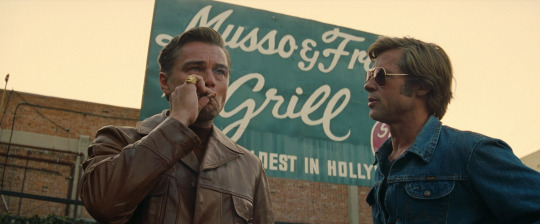
Tagging along is Rick’s best, and maybe only, friend Cliff Booth (Brad Pitt), Rick’s go-with-the-flow stunt-double who in the slowdown of Rick’s career has effectively become his driver and gofer, as well as Rick’s sole source of emotional support. Rick is also neighbors with Sharon Tate (Margot Robbie), the beautiful young actress and wife of then-superstar director Roman Polanski (whose inclusion in the film is minimal and handled tastefully), as she lives out her idyllic life, beloved by those around her like the ray of sunshine she was in real life. Her gated, hillside home looms over Rick’s, as he ponders aloud about how even meeting her the right way could resurrect his career.

For almost two-and-a-half hours, we follow these three characters as they just live out their lives, Rick nursing hangovers and having emotional breakdowns in front of his 8-year-old co-star on set while contemplating his future, Cliff going where the wind blows him while taking care of his adorable and highly-trained dog, and Sharon as she drives around Old Hollywood, spends time with her friends, and sneaks into a matinee showing of one of her movies, her eyes and infectious smile beaming with pride when the audience laughs at her comedic timing and cheers her martial-arts prowess.
I think it’s safe to say it’s not the film any of us were expecting from Quentin Tarantino. Having only made loud, gory, over-the-top genre pastiches for the last 15 years, you’d expect from the trailers for this to be about an actor and his sexy stunt-double getting mixed up with the Manson family before teaming up with Bruce Lee to save Sharon Tate from her horrific real-life fate, mixed with the filmmaker’s usual self-indulgent homages to films of yesteryear. While some of this is true to some extent, it’s surprisingly a much more relaxed, easygoing dramedy that follows a trio of funny, charismatic people as they just…exist, as people living in the moment instead of relics.
OUATIH is much more concerned with atmosphere, character, and capturing the feeling of a bygone era than the traditional narrative structure. It’s more effective than pretty much every nostalgia trip movie I've ever seen because you can feel Tarantino's affection for this era of his childhood bleed through every character, car, song, radio advertisement, TV show, background poster, etc. It’s through this meticulous level of detail and willingness to just hang out with these characters and take in this world that he reconstructed, Tarantino successfully resurrects the era in all its 35mm glory, but with the knowing twinge of real-world melancholy.
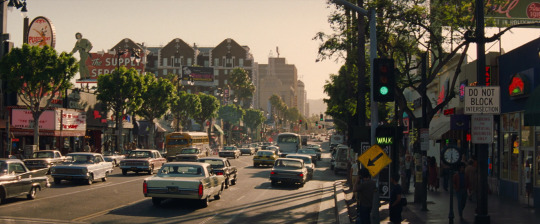
I guess the reason I love it so much is because the love that Tarantino has for everything and everyone in it is so tangible that it’s infectious. Watching OUATIH I honestly felt like I understood him better as both a filmmaker and as a person. He shows a level of restraint and maturity I haven’t seen since JACKIE BROWN. Even most of his trademark foot fetishizing is tasteful and subdued (I say “most” because I recall at least three close-ups of actresses’ feet that definitely made him a bit sweaty behind the camera). He’s a weird, shameless nerd with a big ego, but he’s 100% sincere about expressing his love for film and its rich history. And it’s this love, and the skill and style with which it’s expressed, that just put a big smile on my face each of the 6 (SIX) times that I’ve seen it since it came out.
Tarantino offers a tantalizing contrast between reality and fantasy. Throughout the film, as the characters of Hollywood live in their own idyllic world, relaxing in pools or driving around in bitchin’ cars, we also see the disquieting eeriness and griminess of the Manson family. The soundtrack and accompanying old-timey commercials for tanning butter or Mug Root Beer that plays through a lot of the film is a joy to listen to, but we also hear news bulletins of the war in Vietnam or the aftermath of the Bobby Kennedy assassination. You could argue this is just to set the scene for the era, but it feels too deliberate, because even after that joyously fantastical ending, we remember that it was just a fairy tale and real life didn’t turn out as pleasantly. Tarantino’s ability to make his world and characters so meticulously detailed and lived-in works to great effect in instilling a bittersweet melancholy to this film in a way I was really taken aback by. It feels like a window into his soul, someone who yearns for the fantasy of the world he grew up in but remembering that not all good things last and not everything in your nostalgic past was good to begin with.
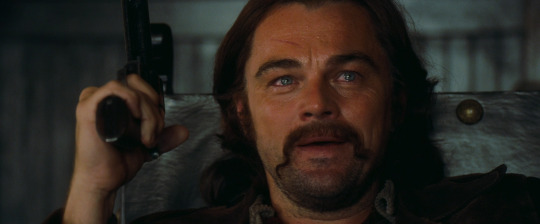
One beautiful, spellbinding scene is Rick and Cliff coming back from their excursion into the world of Italian filmmaking. In this montage, we see Rick, Cliff and Rick’s new Italian wife arriving at the airport and driving home before unpacking their baggage, interspersed with Sharon Tate welcoming a guest at her home and having lunch, before cutting to a series of shots of famous LA landmarks like Grauman's Chinese Theatre, Taco Bell, and Der Wienerschnitzel all meticulously resurrected in their retro glory as they light up the night. “Baby, baby, baby you’re out of time”, sings Mick Jagger as we’re watching multiple stories about people who are each embodying those words: Rick’s career, his friendship with Cliff, Sharon Tate, and Hollywood itself.
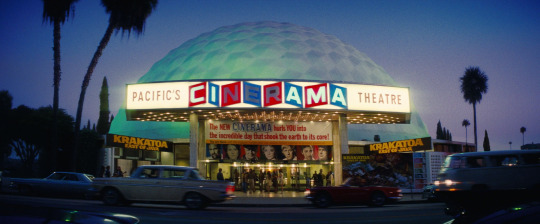
Tarantino himself feels like one of the last mainstream auteur filmmakers, as well as one of the last and biggest proponents of shooting large-budget movies on film (even Scorsese’s embraced digital now, the fantastically-talented traitor). And with the rise of streaming services, one can’t help but feel like the movie-going experience itself is also becoming obsolete, especially recently, what with theaters going to war with distributors over fucking TROLLS: WORLD TOUR, not to mention that global pandemic we’ve been having lately all but killing general audiences’ enthusiasm for the movie theater experience (Christopher Nolan’s TENET certainly didn’t help). If all these things, both real and fictional, are indeed out of time, then at least with Tarantino’s penultimate film they get one hell of a bittersweet sendoff, a great time that’s more of an Irish wake than a funeral, and it’s a film I have no issue calling a truly introspective, late-career masterpiece.
And that’s without mentioning uniformly incredible cast. Leo DiCaprio, an actor I normally don’t care too much for, gives the best and funniest performance of his career as a dependent prima donna actor clinging to his remaining fame. Brad Pitt earns the hell out of his Oscar as an embodiment of old-school masculinity and charisma with an amazing set of abs (and everything else) whose outward coolness masks his mysterious past and complete badass-ness. Margot Robbie shines in her depiction of Tate, a beacon of warmth and likability who in many ways symbolized the love and carefree attitudes of the swingin’ 60’s. I’ve heard people criticize her character for not having a lot of dialogue, but to me it feels like they’re ignoring the visual storytelling, which just gives way to them assuming the film is sexist just because the female lead isn’t constantly monologuing. Every member of the supporting cast is memorable with their own quirks and great lines, no matter their screentime.
And of course, it wouldn’t be a Tarantino joint without some truly hilarious and shocking violence, and without going into spoiler territory, the last 20 minutes delivers on this promise to such a degree that I feel comfortable calling it the best thing he’s ever done. Some may decry the climax as unnecessary or over-the-top, but the way it leads to an alternate world while subtly acknowledging what happened in the real one is cathartic beyond belief. And if you’re paying attention, every scene in the movie has been quietly building towards this finale, which to me takes away any potential of feeling meandering in the story. If you saw the movie and didn’t much care for it, I recommend giving it another watch. Having the context ahead of time makes it feel so much more rewarding, and even on the fifth watch I’m noticing clever, subtle set-ups I missed beforehand.
It’s also just super cozy and really easy to watch. The two hours and 45 minutes fly by. I could watch a 4-hour version of this.
Quentin, if you’re reading this, please don’t let your last movie be Star Trek.
2 notes
·
View notes
Text
what more can you do?
WOO! this week’s episode was sad and weird and badly paced and startlingly, unevenly mature in true titans fashion. i loved it (with reservations)! let’s talk about it in excruciating detail:
SPOILERS ahead.
1. i can’t say that i’m awfully thrilled about the show following up on a character’s literal suicide attempt by... not addressing said suicide attempt at all. maybe it’s the awkward way an entire episode’s worth of flashback was shoehorned in between the end of 2.07--where dick literally talked jason off the ledge while in the throes of a psychotic break of his own--and the beginning of this one, but it’s honestly not just bad storytelling, but irresponsible storytelling.
1.5. in a general sense, tho, the tableau at the beginning of the episode is so egregiously unfair--so shockingly, plainly one-sided, with a slump shouldered dick facing the world, only kory on his side, that it’s quite apparent that it’s the lowest these heroes can go. and i do think their individual reactions to dick’s confession provide an interesting insight into their characters. hank and dawn have been operating alone for so long, each a reminder of their traumas and losses and very human frailty to the other, without even the resources that dick and the batman enjoy. it’s been them v the world for so goddamn long; is it any wonder that they were looking for the first excuse to bail out of there, to not Deal with the idea that what they were doing to deal with their traumas and guilt was clearly not working, and dick was--and has been always--so willing to be the scapegoat? hank punching dick was utterly unwarranted--but i can accept that as part of the unaddressed emotional outbursts arising out of years of accumulated head injuries from both college football and vigilantism. (this isn’t to excuse what he did but to contextualise it within hank’s history and personality.) their instinct when facing ugly truths is to retreat to what they think is familiar and what they need--except, as hank realises later in the episode, that’s exactly what’s fucking them up further.
rose is understandably upset at being lied to about her brother’s death and the titans being complicit in the same--but i’m curious that her reaction was to merely leave and not try and fight them. maybe after being defeated by dick while sparring and nearly being killed by rachel she was sensible enough to realise that she couldn’t take them on all at once? i don’t know--she’s curiously been a bit of a cipher this season. jason leaving with her made sense tho--unburdened of the weight of being the team’s scapegoat, understandably miffed at dick for keeping a secret that nearly cost him his life and left him with a great deal of trauma, just Angry at the world in general, he gravitates towards rose, the only other outsider/rebel who tried to reach out to him when everybody else shunned him or looked at him like an impostor. i think the decision was more impulsive than anything--they still look confused and uncertain in the taxi as they leave the tower behind. but--i don’t know. theirs is the storyline that i’m the most perplexed about. we just don’t have a lot of information about either of them, rose especially.
(a part of me still thinks she’s slade’s mole in the tower. but why would she leave if she is? to keep up appearances bc to react in any other way to the news of her brother’s death would be suspicious? maybe she left because her job is done and the titans were splitting up? maybe she was part of the long game to seduce jason over to slade’s side--seeking revenge for dick swaying jericho over to the titans’? am i going to stop asking myself questions in this post? am i ever going to write a review that’s not just stream-of-consciousness nonsense? only time will tell.)
DONNA. oh, donna. her decision to leave seems to me a logical continuation of her s2 arc that i’d talked about in a previous review--paranoid, insecure, retraumatised, and taking out her frustrations on jason and dick. it’s also very interesting to me that she complained to rachel about dick treating them like “soldiers” and only told them things that he deemed that they “need[ed] to know.” it was because of jillian and whatever mysterious business that themyscira was conducting in sf that she and garth and slade ever landed up in that airport at all; even worse, jillian deemed it was something that donna didn’t need to know until it was too late. donna lost so much in that fiasco--the man she loved, her friends, several members of her amazon family, and her sense of purpose, her belief in her strength and her destiny and her faith that other people trusted her as a warrior and as a leader. she’s projecting all that pain onto dick--who again, doesn’t deserve all this shit but takes it anyway because of his own issues.
1.8. and, like. as much as jericho’s death became the Traumatic Event that overshadowed almost everything else in dick’s life for the last five years and helps explain a lot of his hang-ups right from s1, it just doesn’t have the same significance for the others. don’t get me wrong--i’m sure hank, donna and dawn are devastated and guilty about the part that they had to play in manipulating jericho and his eventual death. but their issues with each other, with the titans tower and with their past run deeper and in different directions, and i think all of that came into play when they each decided to go their separate ways.
1.95. idek what the fuck is going on with rachel. i felt every ounce of dick’s heartbreak and devastation when she got up to leave with donna. for all that she saved dick in the first episode of this season, she still hasn’t reached the point where she’s willing to unburden her emotions and issues on him. it must be frustrating and sad for her to realise just how much dick didn’t trust her either. but there’s something else going on as well: maybe she’s realised she has no real control over her re-emerging powers, and, carrying on with the fatalistic attitude she had at the end of 2.05, she wants to spare the titans the chaos and darkness that she carries around with her. (she’s used to running away at this point, after all.) she goes with donna bc donna knows her the least: it would therefore be easy to fool her and escape.
2. more faddei! and kory backstory! \o/
it’s curious that they never once bring up trigon, because s1 gave the impression that she’d come to earth with a specific mission to seek his portal out and destroy it before he could, y’know, Fuck The Universe Up. faddei makes it sound like kory just went on this fun little sabbatical before taking up royal duties, which kiiinda undercuts a lot of what was cool about her s1 arc. i realise you aren’t entirely happy with your freshman season, titans, and s2 looks like it might be a soft reboot, but you don’t have to mutilate it like this!
but seriously. the stakes just got upped exponentially for kory, and it would be really interesting to see where she goes from here. apart from a promise to rachel, she doesn’t really owe the rest of the titans anything--not that i think she views relationships in such transactional terms, of course. on the other hand, abandoning her responsibilities on tamaran has led to its takeover by an unfit leader and the deaths of several of her family and friends. the choice shouldn’t be a choice at all. she should go back home. and yet--she waited too long, and the choice has been taken away from her. faddei is dead, both of their ships are destroyed, and she is stuck on earth, grieving and frustrated and furious. kory is usually very clear headed about exactly where she stands emotionally, but after such a big event, she must be feeling so much pain, guilt, sorrow, anger, even resentment. it’s so easy to look at kory’s level-headedness and open, empathetic personality and use her to prop up other characters, but i hope that this isn’t always the case, and that she’ll be allowed to really work through these emotions while somebody else looks out for her.
2.35. (the little snippets of faddei and kory just enjoying the shit out of the Little Things that humanity has to offer is just... it filled me with so much warmth. i wouldn’t mind an entire episode of them just chilling and exploring and annoying each other with badly-applied out-of-context pop culture references)
2.5. blackfire! i don’t know much about comics!blackfire beyond “she was starfire’s sister, Evil, and possibly sold her sister into slavery??? yikes” so i’m just going purely off what the show has revealed about her so far. it was honestly disconcerting to see so many references to her possible disability (?) and to see both that and the efforts to accommodate her spoken about in... i want to say mocking way? i don’t know. i just saw a murder mystery/thriller movie today where the serial killer was revealed to have been both disabled from birth and mentally ill, and maybe i’m just feeling extra sensitive to the truly disturbing and pervasive trope of having disabled characters be Evil--and tying their Evil to their disability.
2.8. anyhow, blackfire appears to have accumulated a fair bit of power in the time that kory’s been gone: not only can she remotely possess other tamaraneans but she can blow up their ships too. (and didn’t faddei say that she had goons on the ground, looking for starfire?)
2.9. it’s a Lot to deal with this late in the season. maybe kory will leave for tamaran to deal with blackfire once and for all at the end of the season. and if titans ends up cancelled, wouldn’t that be a bittersweet ending.
(wherein ‘bittersweet’ translates to ‘devastating’ ofc)
3. oh where do i even start with dick
his worst fears came true. after his confession, not only did his old friends up and leave, but so did rachel and jason, which he found more heartbreaking than anything else. utterly consumed by guilt and convinced more than ever before of his culpability, he actively seeks out ways to self-flagellate, first by going to adeline to apologise, then by banishing himself, then by making sure he is punished (tho i have my doubts on that last one; will elaborate a little later). after watching him have an extended psychotic break and dash into not one but two suicide missions, watching dick grayson do this to himself feels like watching an extended feature on human suffering. it’s not fun, or pretty, and i can feel it reaching its nadir so that dick can bounce back up again, but i hope it happens soon.
(dick’s natural tendency to internalise guilt and responsibility into a hard little diamond core at his centre and his long training with batman with all the emphasis on secrets and subterfuge with a healthy underpinning of paranoia ironically means that he does so much goddamn emotional labour for this team. he’s the glue that keeps them together, that gives them purpose. he’s trying so hard to do good by everybody that he isn’t really able to achieve it with any of them, which leads to another self-flagellating spiral and him determining to try harder and the cycle just keeps going on. only kory seems to have ever broken this cycle, because she’s never demanded anything of him, nor he of her. it’s really sad to think how bereft dick feels right now, and more than that, how it’s stopping him from being there for the people who really do need him and trust him, like gar and rachel.)
3.25. adeline makes a very good point about how merely apologising doesn’t mean you’re owed forgiveness, and that seeking it out after all these years is a self-serving exercise in itself. but i can see dick taking it hard, especially after discovering that she’s letting slade--the man who actually killed her son--recuperate at her home. (and let’s be clear: however good her intentions, she participated in lying to her child about the truth of what his father actually does. wow, jericho was really just fucked over by pretty much every one he loved, wasn’t he?)
but i am glad to see dick isn’t so far gone that he takes the blame for jericho’s death in front of slade. he’s very aware that slade has permanently broken the team and very aware of the threat slade poses if they ever try to get back together again, but he’s not going to completely surrender every last shred of his self-worth and dignity to this man, and that was refreshing to see.
3.5. so he banishes himself to the farthest place he can think of with nothing more than the shirt on his back and a single duffel bag. it’s so over-the-top yet so... dick grayson.
3.8. BUT WAIT! ~PLOT TWIST~
ok so here’s what’s happening, all right? strap in:
a) jericho is one hundred percent inside slade. i have no doubts about this. adeline knows this too. it’s why she was so even-keeled while talking to dick, why she confidently said that jericho loved dick, and why she said “they” might be willing to forgive him. i’m thinking when slade crawled back home, jericho took advantage of his father’s momentary weakness to tell what was happening to his mother.
b) jericho tried to communicate to dick. i saw something somewhere which said that slade had gestured something very specific in asl while conversing with dick? i’m willing to believe that was intentional.
c) when dick was turning to leave and slade called him one last time and gave his “banishment sentence” jericho likely jumped bodies from slade to dick
d) so why did dick get himself arrested at the airport?
- dick was going through, as others have speculated, a dissociative episode. given how he’s exhibited signs of mental illness throughout this season this isn’t that far out of the realm of possibility, but it’s a weak and redundant narrative bridge and wasn’t shot in a way that suggested that it was a mental break. so i’m ruling this out.
- jericho took over. maybe he felt that this was the only way he could force dick to stay in sf. maybe some of his father’s anger/resentment leeched into him and he wanted to dick to experience some actual punishment instead of scarpering again. maybe he was overwhelmed by dick’s own self-flagellating tendencies and chose the shortest route to maximum pain. maybe it’s a combination of all three.
- dick finally got his brain into gear and realised at the last minute that jericho had possessed slade and was trying to tell him something. why he then proceeded to get himself arrested instead of running out of the airport is a mystery.
personally, i’m leaning towards the ‘jericho possessed dick’ possibility.
4. gar is such a sweetheart and i am so glad that he took centrestage this episode, even though, like always, it was to support another character and ended up with him crying and begging for help from an unresponsive dick. *sighs*
4.5. much like dick himself, he’s trying to do good by everybody, only to end up badly misjudging a situation, and all alone.
5. oof. this has gone on for far too long and i am Tired. more thoughts to come later, because right now my brain is as disorganised as... as disorganised as a titans episode. hah! self-burn!!!
#titans#titans spoilers#dick grayson#koriand'r#garfield logan#hank hall#dawn granger#donna troy#rachel roth#slade wilson#meta#aaaah this is 2.6k+ words long I'M SORRY
74 notes
·
View notes
Photo

For the week of 28 October 2019
Quick Bits:
Afterlift #1 is a digital original from Chip Zdarsky, Jason Loo, Paris Alleyne, and Aditya Bidikar. Very interesting concept here playing with a character who drives for a Lyft analogue in Cabit, leading to becoming a rather unique courier.
| Published by Jams & Jellies

Batman Annual #4 actually gives us many adventures and stories as we go through almost two months’ of diary entries of Batman’s exploits from Alfred, as told by Tom King, Jorge Fornés, Mike Norton, Dave Stewart, and Clayton Cowles. It’s a nice way to pack a lot of story into this annual in a fairly unique way, while also showcasing just how busy Batman really is.
| Published by DC Comics

Black Panther #17 sets up for the next confrontation with N’Jadaka and his forces, also giving us a rather...awkward but interesting conversation between Storm and Nakia. Gorgeous art from Daniel Acuña.
| Published by Marvel

Bloodshot #2 continues the balls to the wall action as Bloodshot and the Black Bar conflict escalates, from Tim Seeley, Brett Booth, Adelso Corona, Andrew Dalhouse, and Dave Sharpe. It’s a bit of a throwback to a more action-oriented style, but it definitely works for Bloodshot. A nice change of pace to give a variety of storytelling.
| Published by Valiant
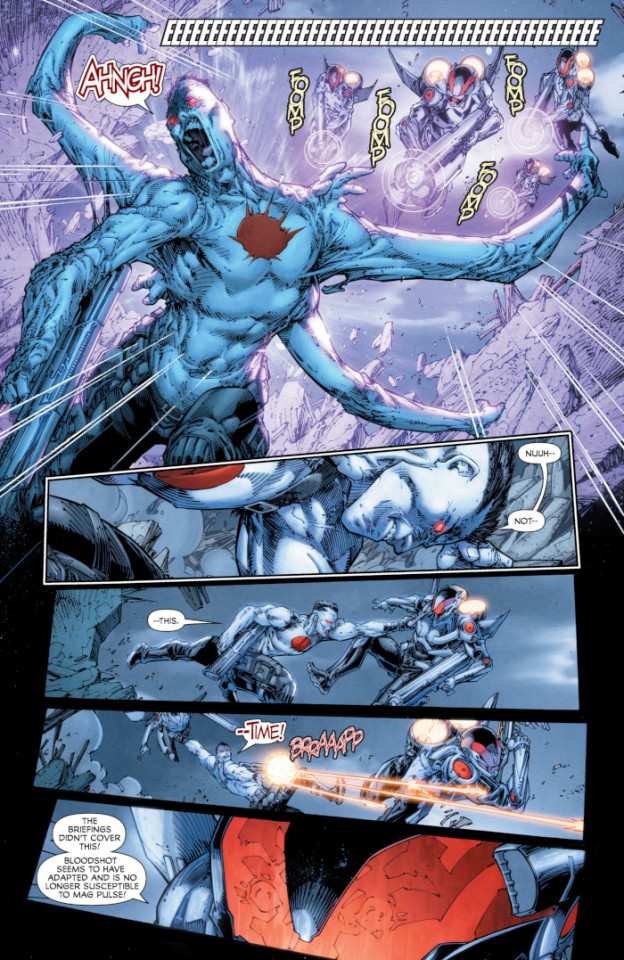
Conan the Barbarian #10 spins us the twins’ yarn as they plotted their revenge on Conan, from Jason Aaron, Mahmud Asrar, Matthew Wilson, and Travis Lanham. The art from Asrar and Wilson is gorgeous. The backstory building up to last parts of this story and the fate of Conan is gripping.
| Published by Marvel
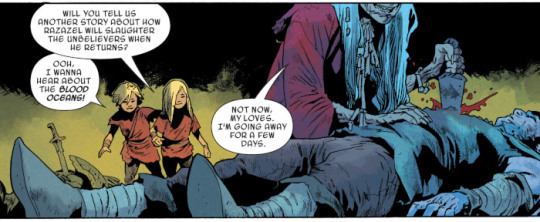
Contagion #5 brings an end to this series from Ed Brisson, Adam Gorham, Veronica Gandini, and Cory Petit. Gorgeous and creepy art here from Gorham and Gandini.
| Published by Marvel
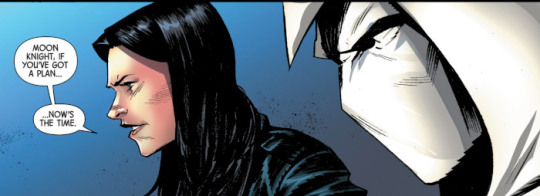
DCeased #6 is surprisingly hopefully, even as everything dies and everybody hurts. It appears to be setting up a sequel, though likely to be incredibly bleak. Tom Taylor, Trevor Hairsine, Neil Edwards, Stefano Gaudiano, Rain Beredo, and Saida Temofonte conclude this series in epic fashion as we say goodbye to Earth.
| Published by DC Comics

Death’s Head #4 is another ending to a series this week, from Tini Howard, Kei Zama, Felipe Sobreiro, and Travis Lanham. Some very nice character work here for Death’s Head and Vee.
| Published by Marvel
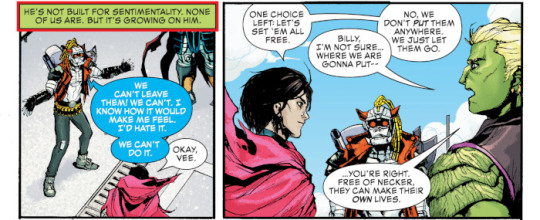
Doctor Strange Annual #1 gives us a pair of tales. The lead from Tini Howard, Andy MacDonald, Tríona Farrell, and Cory Petit is a fun Halloween story dealing with the spirits haunting the Sanctum Sanctorum. Any art from MacDonald is a treat. The back up is a bit more deadly serious with Pornsak Pichetshote, Lalit Kumar Sharma, Sean Parsons, José Villarrubia, and Petit revealing a failsafe should Strange go rogue.
| Published by Marvel
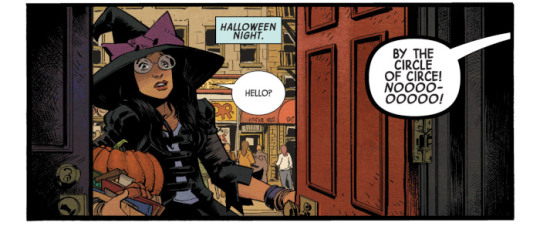
Ether: The Disappearance of Violet Bell #2 continues to be incredibly inventive as Boone tries to track down the assassin. David Rubín’s art is absolutely amazing. And Boone’s continued inability to really think about anyone other than himself is telling.
| Published by Dark Horse

Excalibur #1 is another tick in the win column for “Dawn of X”. The X-Men dabbling in magic isn’t common, but Tini Howard, Marcus To, Erick Arciniega, and Cory Petit do so with amazing flair, fittingly taking us in through Otherworld, Captain Britain, and Betsy Braddock. Apocalypse’s new incarnation as “ •|A| •” and his newfound interest in magic is fascinating.
| Published by Marvel

Five Years #5 spotlights Zoe’s rather elaborate imagination for coming up with ways to murder people. Granted, the Russian agent may well deserve it, but still... Terry Moore continues to deliver some unexpected twists as the end of the world inches closer.
| Published by Abstract Studio

Giant Days: As Time Goes By #1 is a one-shot finale special from John Allison, Max Sarin, Whitney Cogar, and Jim Campbell. It picks up roughly a year from the end of the series, dealing with why Esther has been missing from their reunions. It’s full of all of the humour that we’ve been used to and hammers home the power of friendship. Also, it gets very, very weird.
| Published by Boom Entertainment / BOOM! Box
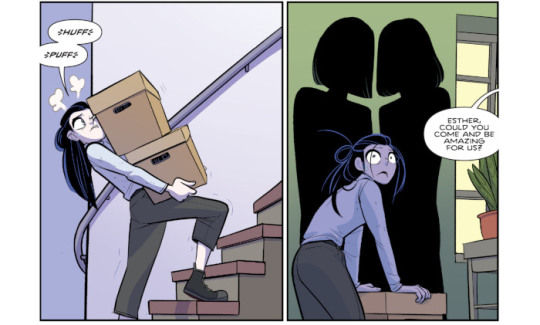
Harleen #2 works hard to portray Harley’s seduction by the Joker. Stjepan Šejić and Gabriela Downie portray it as an insidious, manipulative thing. It might appear romantic on the surface, but there’s definitely a darkness there. There are ideas of bringing back a monster from the edge of insanity, but the story makes you realize that some may well be beyond hope.
| Published by DC Comics - Black Label
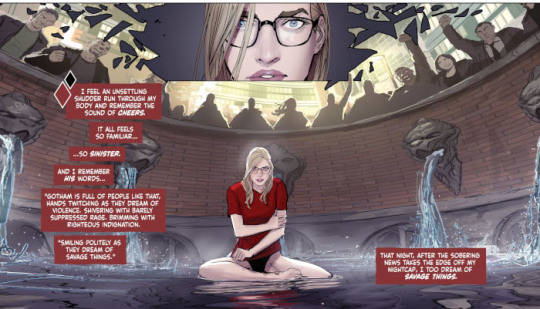
Hellboy and the BPRD: Long Night at Goloski Station might well be the best of these new format tales yet, and both of the previous ones were incredibly strong. Here Mike Mignola, Matt Smith, Dave Stewart, and Clem Robins deliver a single issue story building on Hellboy’s confrontation with Baba Yaga, Sir Edward Grey, and demons.
| Published by Dark Horse

Invisible Kingdom #6 begins the second arc, “Edge of Everything”, as the crew first try to find food and fuel and then run afoul of a salvage ship. G. Willow Wilson, Christian Ward, and Sal Cipriano keep things interesting as we start to see the crew’s life after Lux.
| Published by Dark Horse / Berger Books
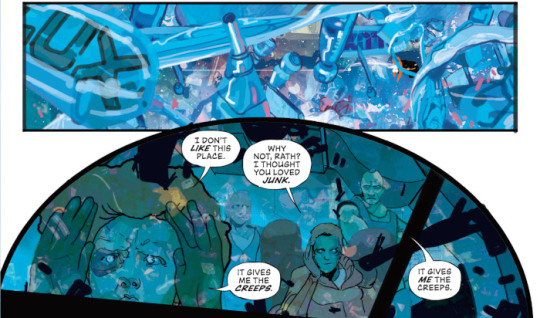
Invisible Woman #4 is disturbing, basically everything goes to hell and everyone that Sue was trusting to see this operation through has let her down. Or worse. Mark Waid, Mattia De Iulis, and Joe Caramagna set up a rather horrifying situation in this penultimate chapter. Again, De Iulis’ artwork is stunning.
| Published by Marvel
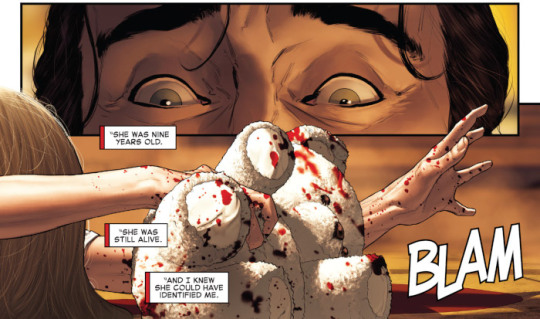
Joker: Killer Smile #1 is essentially a psychological horror from Jeff Lemire, Andrea Sorrentino, Jordie Bellaire, and Steve Wands. It comes from the point of view of a psychiatrist, Dr. Ben Arnell, who is trying to get to the heart of Joker’s mental state. It’s not going so well and it appears like the good doctor is losing time, doing strange things, and possibly worse. Very intriguing beginning to this story.
| Published by DC Comics - Black Label

Knights Temporal #4 has some stunning artwork from Fran Galán, particularly during the gangster sequences where colour comes into play as another important storytelling element. There are some very nice twists this issue, making you wonder about a lot of what we thought we knew.
| Published by AfterShock
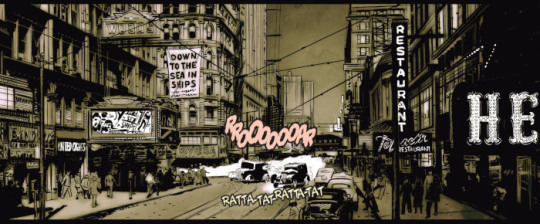
The Last God #1 is dark fantasy done right by Phillip Kennedy Johnson, Riccardo Federici, Sunny Gho, Dean White, Tom Napolitano, Steve Wands, and Jared Blando. It gives us lying kings, heroes who weren’t rightly heroes, and a Lovecraftian terror returned to show the truth. It plays deep on resentment and distrust, and of a complete failure of institutions to uphold a decent society. All with absolutely stunning artwork from Federici, Gho, and White. This is a beautiful, haunting work.
| Published by DC Comics - Black Label

Last Stop on the Red Line #4 is very, very weird. We get a peek behind the masks of the monsters and it’s even stranger. There’s a very interesting mix of symbolism and the supernatural where we’re really not sure where one begins and the other ends. This was a very unique series from Paul Maybury, Sam Lotfi, and Adam Pruett.
| Published by Dark Horse
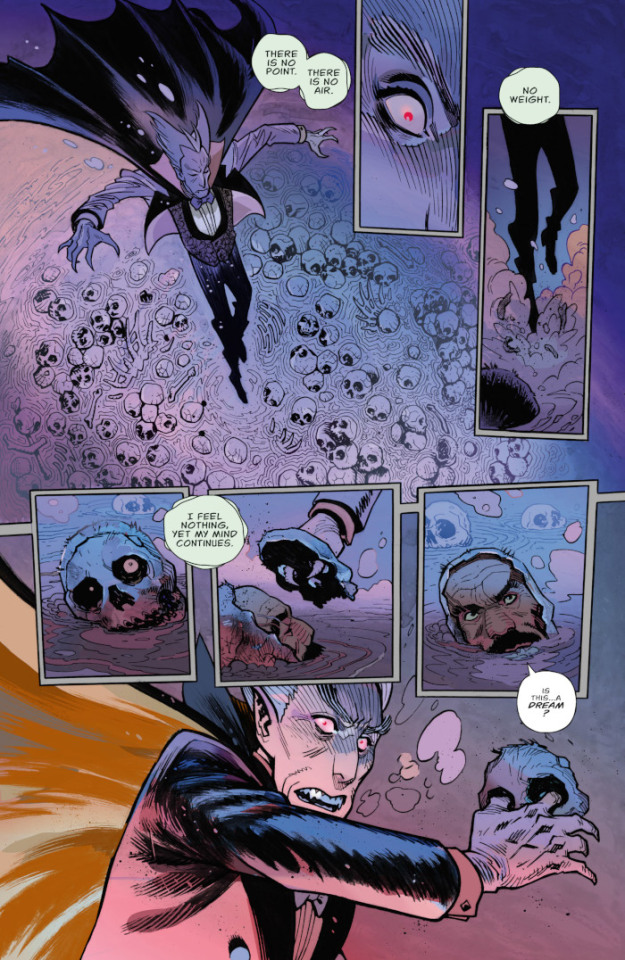
Mall #3 goes even harder into inter-faction warfare as it seems like all of the groups are at one another’s throats. Great world-building here from Michael Moreci, Gary Dauberman, Zak Hartong, Addison Duke, and Jim Campbell, with some interesting plot developments.
| Published by Vault
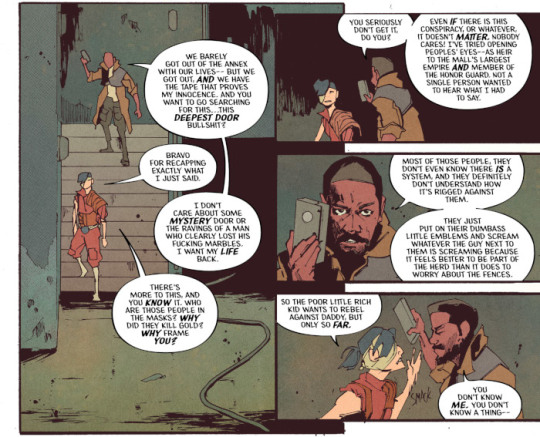
Manor Black #4 concludes the series as we see what essentially amounts to order vs. chaos as the old blood takes on wild magic. This doesn’t feel so much as a conclusion as an end to a chapter of a wider arc, leaving much unresolved. Hopefully we see more. The artwork from Tyler Crook is phenomenal.
| Published by Dark Horse

Marvel Zombies: Resurrection #1 is really damn good. Phillip Kennedy Johnson, Leonard Kirk, Guru-eFX, and Travis Lanham kick off this series with a new angle on the Marvel Zombies, playing up more on the horror angle, with a truly terrifying spread of the disease through a new vector. Gorgeous artwork from Kirk and Guru-eFX.
| Published by Marvel
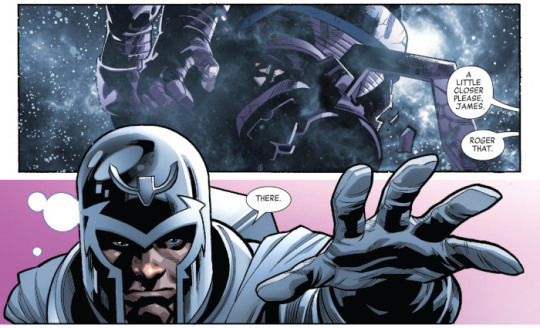
Monster Planet #1 is the kind of thing that you used to see regularly published by Image and Top Cow, the military action comic that throws in horror elements, from Joe Brusha, Marcelo Mueller, Maxflan Araujo, and Taylor Esposito. It’s not bad, setting up a world where humanity has been turned into dinosaur-like beasts and the remnants of society need to turn to classical monsters for help.
| Published by Zenescope
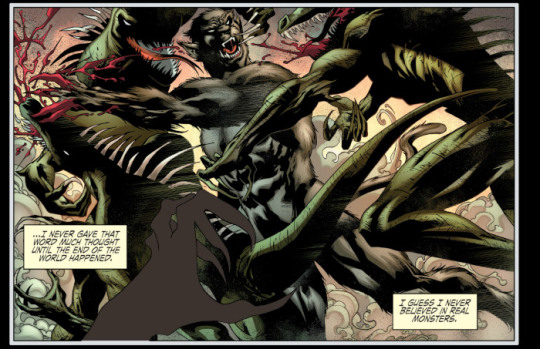
The Necromancer’s Map #3 takes a bit of a different approach, giving us a fair amount of action as Tristan’s Will catch up with Bethany and co. as well as some great character building in between the action. Great stuff from Andrea Fort, Michael Christopher Horn, Sam Beck, Ellie Wright, and AndWorld Design.
| Published by Vault
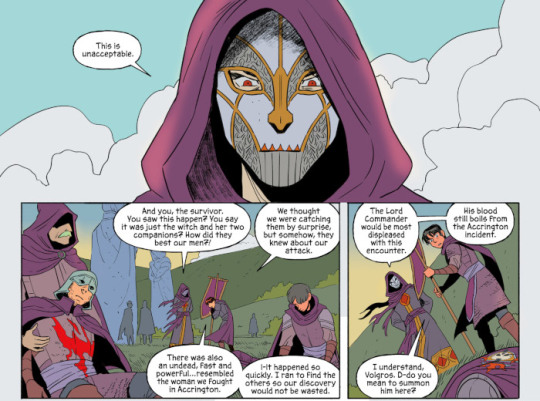
The Plot #2 is wonderful horror storytelling from Tim Daniel, Michael Moreci, Joshua Hixson, Jordan Boyd, and Jim Campbell. Very creepy build of supernatural events once Chase Blaine and his family arrive back at his ancestral home. Hixson and Boyd’s presentation of the black, gooey masses are also disturbing.
| Published by Vault
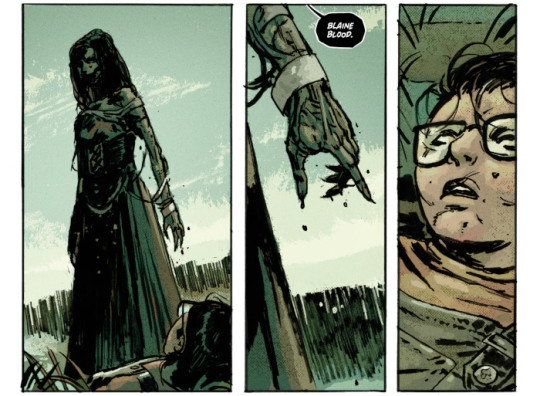
Queen of Bad Dreams #5 concludes this excellent series from Danny Lore, Jordi Pérez, Dearbhla Kelly, and AndWorld Design. Rather interesting confrontation with and revelations about Eleanor Chase here.
| Published by Vault
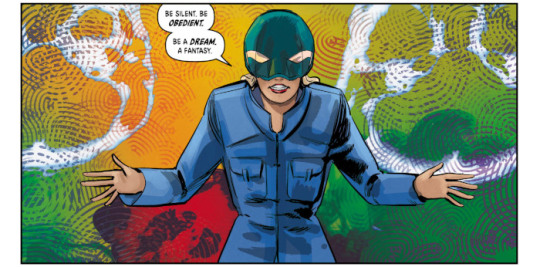
Red Goblin: Red Death #1 is a one-shot featuring three stories set during Norman Osborn’s tenure as the Red Goblin at the end of Dan Slott’s run on Amazing Spider-Man. It’s kind of weird that it doesn’t instead tie-in with current events in Absolute Carnage, but it’s not bad for what it is. The art of the first two stories from Pete Woods is great.
| Published by Marvel

Relics of Youth #2 is even better than the first issue, delving deeper into the mysterious tattoos that the kids have been branded with and their connection to the island that they’ve landed on within the Bermuda Triangle. Matt Nicholas, Chad Rebmann, Skylar Partridge, Vladimir Popov, and AndWorld Design are telling a very compelling adventure here.
| Published by Vault
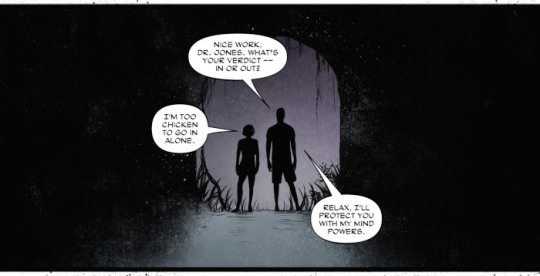
Roku #1 begins another mini-series focusing on one of the luminary villains in the Valiant Universe, this one from Cullen Bunn, Ramón F. Bachs, Stéphane Paitreau, and Dave Sharpe. It’s full of action and intrigue as Roku is hired by an unknown client to retrieve...someone. Things get more interesting as a new face stands in her way and we find out the unusual nature of the target.
| Published by Valiant

The Sandman Universe Presents: Hellblazer #1 is a homecoming of sorts for John Constantine, back to his old haunts alongside some of the other Vertigo corner of the DC Universe. Si Spurrier, Marcio Takara, Cris Peter, and Aditya Bidikar spin a yarn that reconstitutes John after a massive magic war led by an evil Tim Hunter. How exactly the pieces fit are anyone’s guess, but it’s a brilliant darker take resetting him here.
| Published by DC Comics - Black Label / The Sandman Universe

Savage Avengers Annual #1, though largely a self-contained story, is still integral to Conan’s adventure through the Marvel universe and the overall narrative as he, Hellstorm, and Black Widow stumble across a human trafficking ring that bears the marks of Kulan Gath. Gerry Duggan, Ron Garney, Matt Milla, and Travis Lanham deliver a compelling story.
| Published by Marvel

SFSX #2 does further world and character building, showing us just how much has changed since the Party took over, and how utterly betrayed many of the people from the Dirty Mind felt of Avory abandoning them. Very interesting stuff from Tina Horn, Michael Dowling, Chris O’Halloran, and Steve Wands.
| Published by Image

Silver Surfer: Black #5 concludes what has been a very trippy series from Donny Cates, Tradd Moore, Dave Stewart, and Clayton Cowles. There are some very interesting revelations of the past here, and it really makes you wonder about the Surfer’s new incarnation.
| Published by Marvel
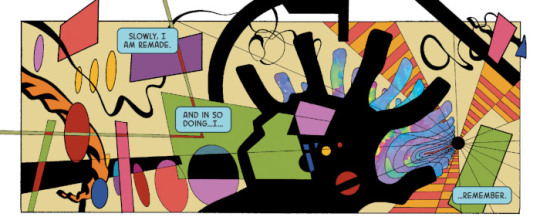
Star Pig #4 concludes the series, kind of, from Delilah S. Dawson, Francesco Gaston, Sebastian Cheng, and Shawn Lee. There’s some rather disturbing tentacles in this one.
| Published by IDW
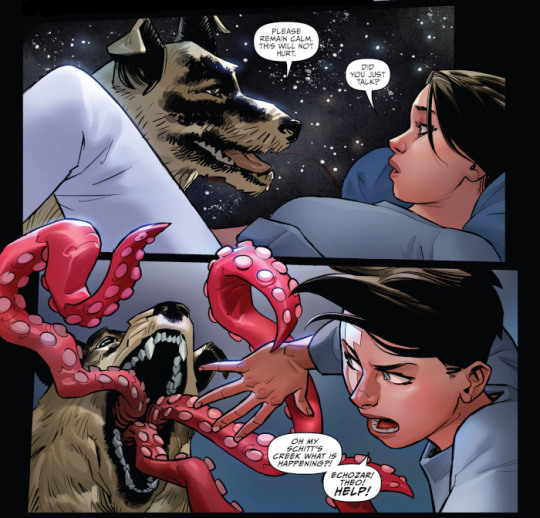
Star Wars Adventures: Return to Vader’s Castle #5 brings an end to this round of the series. I think it’s a perfect approach for some all ages “ghost stories” within the Star Wars universe. Wonderful resolution for the framing story from Cavan Scott, Francesco Francavilla, and AndWorld Design.
| Published by IDW
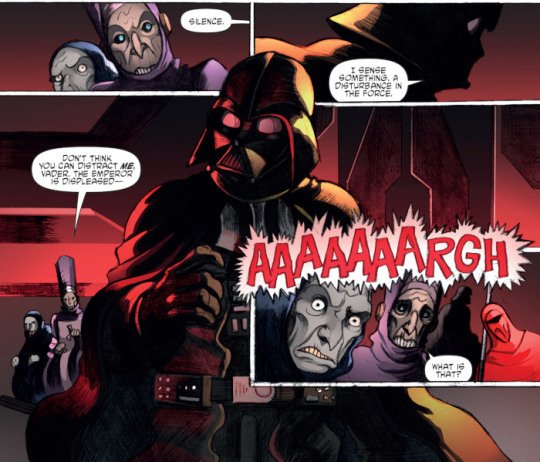
Tales from the Dark Multiverse: The Death of Superman #1 is the second of these one-shots spotlighting DC events gone horribly wrong, this time giving us a much angrier Lois Lane’s grief at the loss of Superman to Doomsday. Jeff Loveness, Brad Walker, Drew Hennessy, Norm Rapmund, John Kalisz, and Clayton Cowles present her as vengeance against a world that didn’t deserve Superman’s grace, raising some of the questions that you’d often see in The Authority. Only, you know, kind of evil. It’s not bad, but definitely dark.
| Published by DC Comics
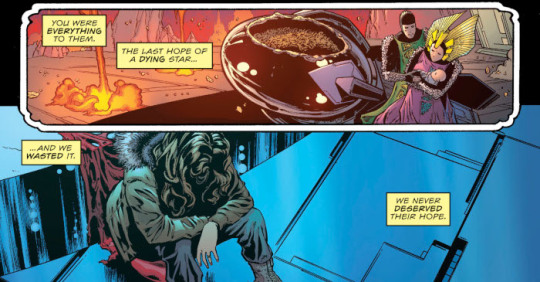
Teenage Mutant Ninja Turtles #99 is the extra-sized penultimate chapter of “City at War” as all of the pieces begin falling into place for the grand finale. The story here from Kevin Eastman, Bobby Curnow, Tom Waltz, Dave Wachter, Ronda Pattison, and Shawn Lee feels truly epic and that something huge may just happen next issue. As it is, there’s still a ton of action here, some interesting developments with the Rat King, more disappointment when it comes to Raph, and something new with the mutagenic bomb.
| Published by IDW
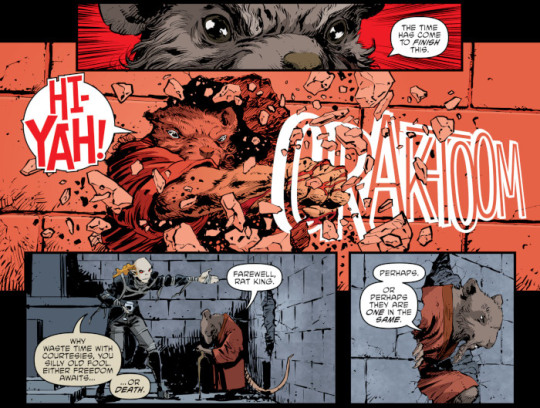
Test #5 is very strange. Christopher Sebela, Jen Hickman, Harry Saxon, and Hassan Otsmane-Elhaou end this story as Aleph and Laurel find one another and a new way is planted, but there’s still seeds of something going awry.
| Published by Vault
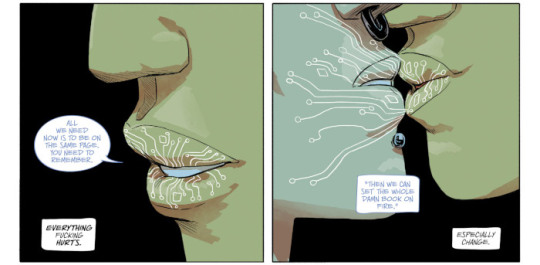
Venom #19 largely plays out the end bits for the Maker and Dylan’s portions of Absolute Carnage, with some very interesting revelations. It seems like even bigger seeds are being lain for future stories here. Great art from Iban Coello and Rain Beredo.
| Published by Marvel

Witchblade #16 gives us the fight between Alex and Haley, after a few distractions and discursions. The stakes are pretty high here and there are a few rather tense moments as it plays out. Beautiful art from Roberta Ingranata and Bryan Valenza.
| Published by Image / Top Cow

Wonder Woman Annual #3 is largely a flashback tale, set five years ago as Wonder Woman and ARGUS attempt to extract an agent sent to infiltrate Gorilla City to see the legitimacy of Grodd’s rule. What Steve Orlando, V. Ken Marion, Sandu Florea, Hi-Fi, and Pat Brosseau do with is establish a new backstory and interpretation for a very old Wonder Woman foe in a fairly interesting way that even ties in to Event Leviathan. It may strain a bit of credibility for the villainous turn, but that will largely depend on the follow-up.
| Published by DC Comics

Other Highlights: Archie 1955 #2, A Basketful of Heads #1, Batman and the Outsiders Annual #1, Chrononauts: Futureshock #1-4, Dead Man Logan #12, Fantastic Four: Grand Design #1, Fight Club 3 #10, Friendly Neighborhood Spider-Man #13, Ironheart #11, James Bond 007 #12, Jim Henson’s The Dark Crystal: Age of Resistance #2, Journey to Star Wars: The Rise of Skywalker - Alliance #4, Jughead’s Time Police #5, Kick-Ass #18, Mighty Morphin Power Rangers #44, Rick & Morty #55, The Ride: Burning Desire #5, Runaways #26, Star Trek: Year Five #7, Star Wars: Doctor Aphra Annual #3, Star Wars Adventures #27, Superior Spider-Man #2, Tremor Dose, Warlord of Mars Attacks #5
Recommended Collections: Amazing Spider-Man: Red Goblin, Amber Blake - Volume 1, Black Science - Volume 9: No Authority But Yourself, Deadpool - Volume 3: Weasel Goes to Hell, Dept H. Omnibus - Volume 3: Decompressed & Lifeboat, Dick Tracy Forever, Hit-Girl - Volume 5, Jimmy’s Bastards - Volume 1: Year One, Lucifer Omnibus - Volume 1, Marvel Action: Spider-Man - Book 2: Spider-Chase, Punk Mambo, Spider-Gwen: Gwen Stacy, Star Trek: The Q Conflict, Symbiote Spider-Man, Thor - Volume 3: Wars End, Tony Stark: Iron Man - Volume 3: War of the Realms, Vamps: The Complete Collection, War of the Realms: Uncanny X-Men, The Wild Storm - Volume 4

d. emerson eddy feels like stale, day old pepperoni pizza.
4 notes
·
View notes
Link
Ben McKenzie is looking forward to his next career chapter after “Gotham,” both on-screen and behind the camera.
During the five years he’s starred as Gotham City police detective and future commissioner James Gordon in the Batman prequel, McKenzie also wrote two episodes and directed three others.
Writing and storytelling are family traditions: His mother, Frances Schenkkan, is a poet, and his uncle, Robert Schenkkan Jr., a Pulitzer- and Tony Award-winning playwright.
“It runs in our veins,” McKenzie said.
In an interview with The Associated Press, he talked about the satisfactions of stretching beyond acting, the joy of playing a movie bad guy, and how the “Gotham” finale must thread the needle for its fans and the never-ending Batman saga. The concluding episode, written by showrunner John Stephens, airs April 25 on Fox.
McKenzie, 40, who has a daughter with actress-wife Morena Baccarin and is stepdad to her son, also noted the difference between parenting and directing.
AP: More actors are getting involved in the production process than in past years. Why is that?
McKenzie: Nowadays, shows are being made for 15, 10, eight, six episodes. That gives actors and writers and directors more of an understanding of the story we’re going to tell. I think an actor who is charged with, for example, being a lead of that project, inevitably has some say in how to structure it. As I get older, I get more interested in being in the room as it happens. Not in a didactic way, not that you’re trying to control the process, but that you want to understand how decisions were made, how we get there, rather than, “Here’s your script. Go.”
AP: The last episode of “Gotham” you directed, “Legends of the Dark Knight,” aired in February. What challenges did it present?
McKenzie: We had a massive fight sequence inside a building that was supposed to be burned out. We had a dog. We had kids. But each episode I direct is a new challenge and it adds to the understanding of the craft, that each challenge has a solution. Whether you get to the solution early or scramble for it, I find it almost always getting done, and you learn from it.
AP: Sounds like home life for a lot of people.
McKenzie: Definitely my home life. We’ve got a dog and we’ve got kids. So I guess I’ve been preparing for this for five years. But I can’t run quite as tight a ship at home.
AP: How a series ends is increasingly important to fans. What makes for a memorable finale and what can we expect for “Gotham”?
McKenzie: I think the key is to not wrap it all up in a bow. My favorite series-ender, to show where I’m coming from, is probably “The Sopranos.” Just leave them hanging. (Laughs). So we do that here. I think John (Stephens) has written an excellent end to the show, which pays off many of the things we’ve been promising the audience for so many years, and yet opens the door to a whole other world (of Batman).
AP: You’re in films including “The Report” with Adam Driver and the upcoming “Live!” playing the villain opposite Aaron Eckhart. Was that character a welcome change?
McKenzie: It was great. I just loved it. He has an earned point of view but he’s a real son of a gun. We shot down in Alabama and I got into the feeling of being back in the South again, (after) growing up in Texas and going to school in Virginia. I have a real fondness for being back there, and this guy had some flair in his talking and how he goes after (Eckhart’s character). That was a fun one.
19 notes
·
View notes
Text
Justice League Keeps Building the Wider DC Universe
https://ift.tt/2MMAInz
Justice League has embraced the sheer lunacy of the DC Universe in ways fans never could have expected.
facebook
twitter
tumblr
If you've been following Justice League over the last year or so, you'll know that this isn't a book that does small stories. If you're going to roll out the heaviest hitters in the DC Universe, then the threats and situations you put them in have to get even bigger and wilder to compensate. For some, the ultimate apogee of "big Justice League ideas" came during Grant Morrison's tenure as writer of JLA in the late '90s. But it's been 20 years since then, the DCU itself has become even bigger and weirder in that time with the return of its storied multiverse, and many creative teams are no longer aiming for blockbuster movies on the page, and instead are embracing all of the storytelling possibilities that only comics can offer.
And the writers of Justice League, Scott Snyder and James Tynion IV, are certainly in the latter category. After rising to fame as the writers of Batman and Detective Comics respectively (and Tynion will return to Gotham City to take over writing duties on the main Batman title in 2020), the pair have gone from outsized detective stories starring the Dark Knight, to tales that play with the very foundations of the entire DC Universe, from the Source Wall itself to the source of heroes powers, to nothing less than the very nature of humanity and where heroes and villains fit into it all. Justice League is sometimes a dense read, even for DC continuity scholars, but nobody would ever accuse this book of being unambitious or resting on its laurels.
It's a story that has been building across the entire DC line for quite some time. The pieces were set in motion in Dark Nights: Metal in 2018, have continued through Justice League all the way through "Justice-Doom War," into the pages of Superman/Batman with the machinations of the Batman Who Laughs, the line-wide Year of the Villain event, and will ultimately lead to Hell Arisen. "It's one huge story, and we want fans to feel rewarded," Snyder says. "If I had one thing I could say to fans, it's that everything matters."
It's all building to a still-unspecified event in DC's future (one we're willing to bet features the word "Crisis" in its title), and a brand new timeline of DC Universe continuity.
“The reason that we're doing the time-spanning, geographical scope of the story where it goes everywhere and everywhen in the DCU and incorporates all these different characters is because it is meant to show that the stakes of this story are the highest they can be,” Snyder says. “It's going to roll into the very thing that begins setting up the reestablishment of that kind of a timeline. The idea is to show you all these characters in one universe.”
A key point of this "one universe" philosophy came in a recent Justice League issue. You would think a story that is responsible for finally returning the Justice Society of America to DC Universe continuity for the first time in nearly a decade would have enough heavy lifting to do. But a key detail about this "first" meeting between Barry Allen and Jay Garrick reveals much about how DC continuity is being constructed, and the teamwork it takes to make it happen behind the scenes. While it has long been teased in The Flash that Barry has merely forgotten his past interactions with Jay (as he had with Wally West before Rebirth), this was the first time it was explicitly discussed. Specifically, the more time Barry spends with Jay, the stronger the feeling he has that they already know each other. Jay, on the other hand, has no idea who Barry is. Why? Because the Jay of 1940 hasn’t met Barry Allen yet, that event is still in his future, while it’s in Barry’s past. Snyder and Tynion say they often consult with Joshua Williamson (writer of The Flash and Batman/Superman) and other writers to keep little details straight.
“We trade scripts and all of that stuff,” Tynion says. “Sometimes, and this is, I think, true of our entire Justice League run, there's an element of lunacy to all of this, and sometimes you've just got to point at it. Because if you don't point at it and you pretend it's not there, fans are just like, ‘Wait, they don't realize that this is nonsense?’ The Flash, especially, is a character who's time-traveled, he's experienced so much in his life, so of course, he is the perfect voice to be like, ‘Oh, yeah, this is all just fricking nuts.’”
Justice League is often gleeful in the way it plays with the weightiest concepts in the DCU, none moreso than with the recent introduction of the Ultra-Monitor, which is what happens when Crisis on Infinite Earths baddie the Anti-Monitor, the Monitor, and the recently introduced World-Forger, join together like Voltron to become an even more powerful cosmic being. It's the kind of reveal that could have been set up with an entire issue of exposition, and instead it's presented in an almost matter-of-fact way, the universe-shattering madness of it all just one more big idea in a book that's been full of them from the start.
“We had talked about that idea so many times, that the brothers form together one singular monolithic Guardian Monitor, that it didn't even occur to me that we hadn't really shown it before,” Snyder says. “Some of this stuff we've talked about so long that it's almost like I don't even remember we made it up and that it's not old DC mythos. ‘Oh, right when Jim Starlin was writing about Perpetua…’ You know what I mean? 'Oh wait, we made that up.' It's tremendous fun dealing with these huge cosmic figures and getting to revisit some of the real touchstones of the DC Universe in terms of its mythology and its legends and its own origin story.”
But despite all this cosmic weirdness, there's an almost primal question driving Justice League, and that's the matter of whether or not human beings are inherently good, like the heroes we admire in superhero tales, or willing to give in to our baser instincts, like the villains they fight.
“I feel like it's a story that's really personal and urgent and resonant for us, because it's about Lex Luthor believing that we're essentially designed to be selfish and cruel and that that's our final form,” Snyder says. “The Justice League is fighting against that belief, and it's a leap of faith in either Justice or Doom, what they meant in their original forms. But like James was saying, the best thing is to be able to have Jarro or whatever be like, ‘It's time for us to cosmically link all of the multiverse threads, stop the meteor of Vandal Savage's moonbeams,’ like that. It's such a fun combination of absolute bombastic ridiculousness and also deep, emotional, truthful storytelling from the two of us. It's just a pleasure. I love working on this book. I really do.”
Snyder isn't alone in his enthusiasm. "The stories that we're telling are some of the most exciting work that I've done since joining DC Comics eight years ago," Tynion says. "It's freaking amazing working with Scott and bringing it all to life.”
Don't believe us about how big this book is? Check out a preview of Justice League #35, which hits stores on Nov. 6. Here's the official synopsis...
It’s called the “Year of the Villain” for a reason— in this issue, Lex Luthor wins! Everything Lex has been working for over the past year and a half comes to fruition as he finally possesses the fully powered Totality and plans to bend Hypertime to his will. The Legion of Doom's leader will defeat the Justice League once and for all and make his final pitch to serve at Perpetua's side-and the Multiverse will never be the same! Francis Manapul returns to Justice League for a key issue on the path to Year of the Villain: Hell Arisen—and beyond!
Justice League #35
Written by Scott Snyder & James Tynion IV
Art by Francis Manapul
Color by Manapul & Hi-Fi
Cover by Rafael Albuquerque
Variant Cover by Tyler Kirkham & Sabine Rich
In Shops: Nov 06, 2019
SRP: $3.99
And check out these killer Francis Manapul preview pages! Even without words, everyone's body language sure says a lot about what went down at the end of the previous issue, doesn't it?
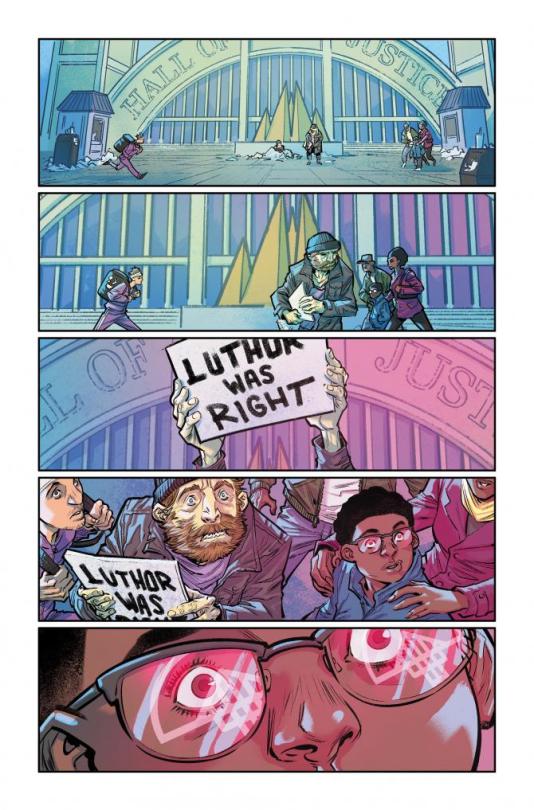
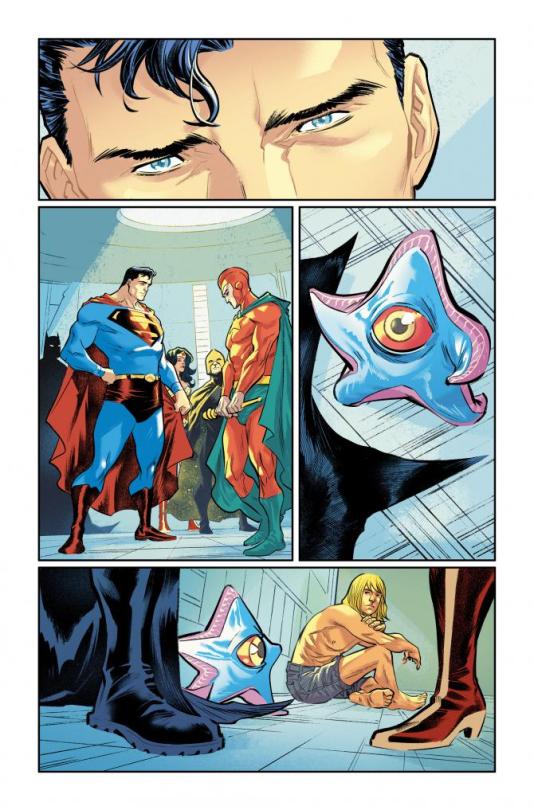

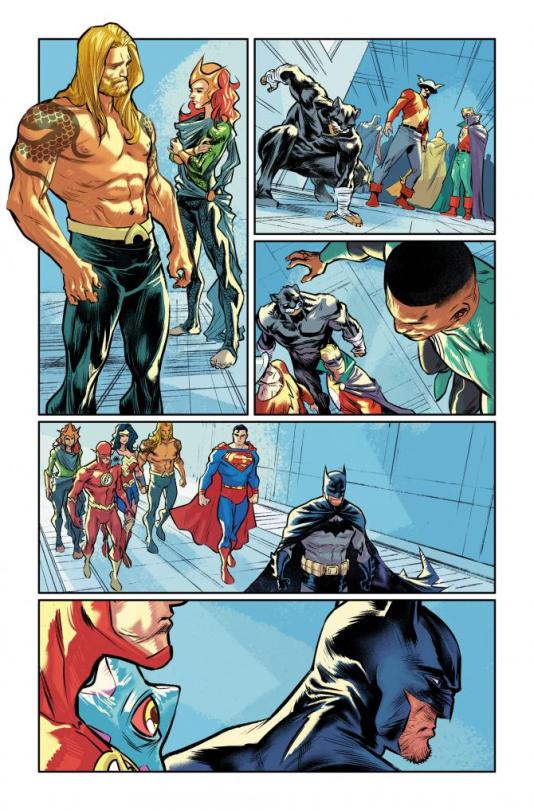
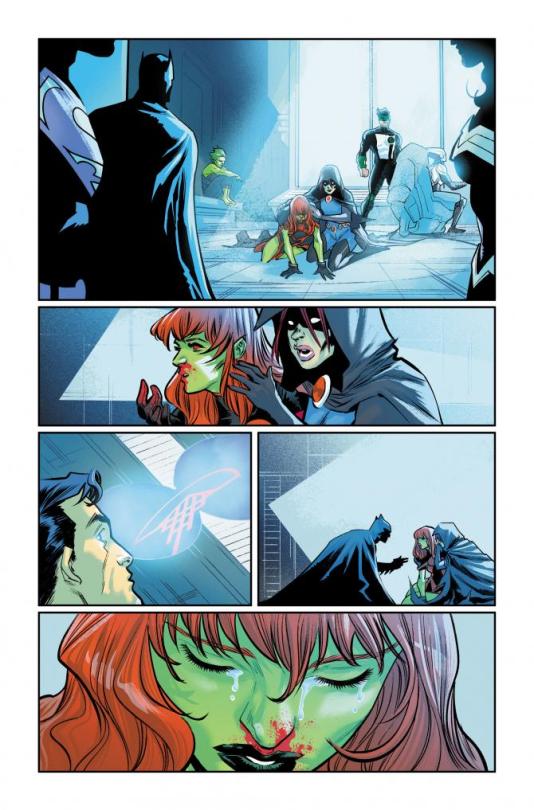


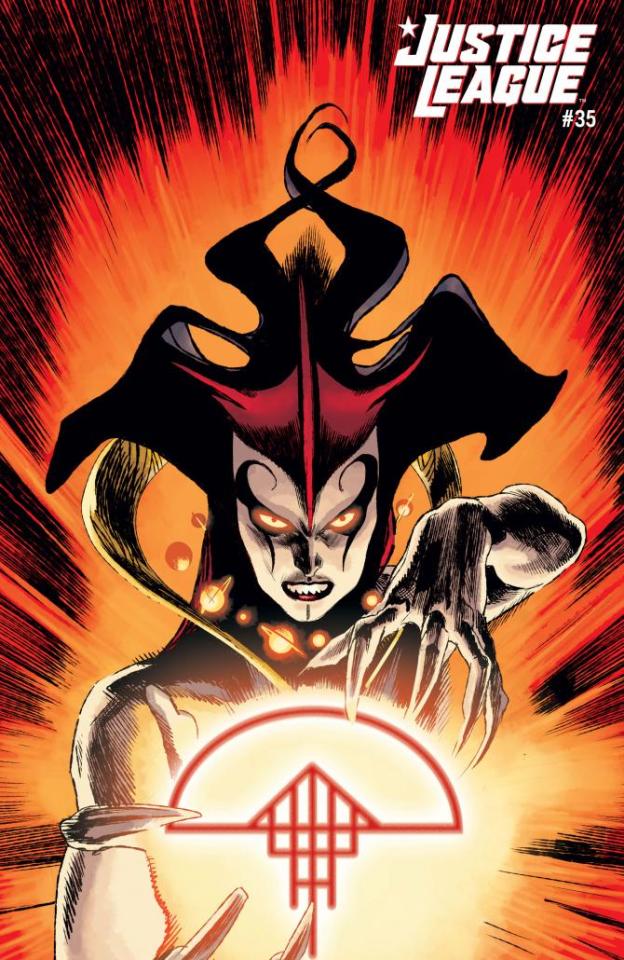

Mike Cecchini is the Editor in Chief of Den of Geek. You can read more of his work here. Follow him on Twitter @wayoutstuff.
Read and download the Den of Geek NYCC 2019 Special Edition Magazine right here!
facebook
twitter
tumblr
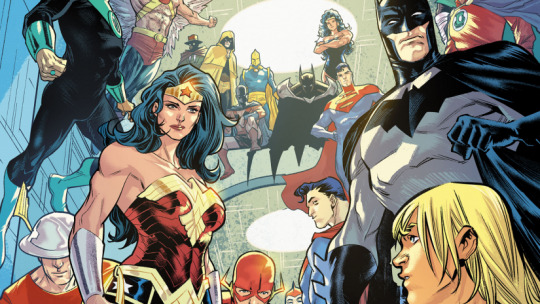
Feature Mike Cecchini
Oct 17, 2019
DC Entertainment
Justice League
Scott Snyder
James Tynion IV
NYCC
NYCC 2019
from Books https://ift.tt/2BlCLcK
1 note
·
View note
Text
Jesse Eisenberg would return to ‘The Social Network’
Actor discusses ‘The Hummingbird Project’, ‘Zombieland’ and returning to Mark Zuckerberg
Published: April 18, 2019 10:58
By Marwa Hamad, Senior Reporter
It’s 9am on Monday morning in New York City and sirens are blaring behind Jesse Eisenberg. The Queens-native is walking to rehearsals of his latest play, ‘Happy Talk’, which opens at the end of the month. Susan Sarandon is the lead, playing the disturbed protagonist trying to save her dying mother — it’s a role that would usually be reserved for Eisenberg, but he refers to Sarandon as “a more than beyond exciting replacement for me.”
“It’s equal parts flattering and mortifying,” says the fast-talking Eisenberg, without a second of hesitation.
“Flattering when it’s going well — you feel like the luckiest person in the world, that the thing that you kind of conceived of in your bedroom is being treated with such care by such talented people. And then mortifying when you feel it’s not going well, and that you’ve let these amazing people down and, you know, ruined their life,” he explains, laughing.
This is standard fare from the genial 35-year-old actor, who has made this cross-continental phone call directly and without the buffer of a publicist — and who apologises more than once for having someone accommodate his busy schedule.
Eisenberg appears this weekend in ‘The Hummingbird Project’, an unusual heist film about beating the stock market by milliseconds to make millions of dollars. In it, he stars across from physically transformed versions of Salma Hayek and Alexander Skarsgard.
Skarsgard, who plays Eisenberg’s cousin, is particularly unrecognisable to his usual self. The statuesque Scandinavian actor was getting his hair plucked out one by one with a tweezer the day they met.
“Even more than enjoying watching him was the feeling that I can kind of treat him like a kid,” says Eisenberg.
“[His character is] so socially inept that I have to really take care of him, so the fact that he kind of is not this gorgeous, tall, attractive guy makes it easier — because I think it would be a little more difficult to try to treat the real Alex like a child… With him, it was just particularly easy and fun because he committed so fully to this guy.”
THE SOCIAL NETWORK — TAKE TWO?
It’s a big year for Eisenberg. Aside from ‘The Hummingbird Project’ and his star-led play, he will also appear in the long-awaited sequel to the post-apocalyptic cult comedy ‘Zombieland’.
Ten years after the first film, the original cast — Eisenberg, Woody Harrelson, Emma Stone and Abigail Breslin — will return in ‘Zombieland: Double Tap’, which releases in October.
“The schedules were obviously difficult, but more than the schedules was just the fact that we wanted to make sure the script was right, and so it took really almost 10 years to get a script that we all agreed was worth going back and doing,” says Eisenberg.
“Because the first movie is not just a popular movie, but also kind of a beloved movie... It was actually a movie that people love and feel a personal connection to and watch over and over.”
The award-winning biopic ‘The Social Network’ will also celebrate a decade next year, and with it Eisenberg’s Oscar-nominated portrayal of billionaire entrepreneur and creator of Facebook, Mark Zuckerberg.
Writer Aaron Sorkin said earlier this year that it’s time for a sequel. Would Eisenberg be onboard?
“I don’t know anything about it, but yeah — I mean, I love that kind of thing in terms of playing a character again,” he says.
“My background is in theatre — I’m actually walking to my play rehearsal now, where you would do a show 200 times and still feel like there’s more to explore. Obviously, if it’s a good role, you’re happy to play it in perpetuity.”
ABSURD PLIGHT
Eisenberg’s career has been varied — from the comedy-drama ‘Adventureland’ and the indie drama ‘Holy Rollers’, to the heist franchise ‘Now You See Me’ and playing bad as Lex Luthor in ‘Batman v Superman’. He consistently revels in the kind of comedy “that comes from the character’s absurd plight, rather than the character talking like a stand-up comedian, or something.”
“There’s something particular about that tone that really allows me to be fully dramatic and funny in a way that feels real to a character rather than just telling jokes,” he says.
Several of his films have a social commentary aspect to them, as well, with ‘The Hummingbird Project’ labelled by some as a capitalist critique. Does the actor have a specific message he wants to convey through his body of work?
“Not in particular, but I only like to do things that align with my set of values,” says Eisenberg.
“My wife has been heavily involved in issues of domestic violence and also works with like, 100 inner city schools in New York City... She’s politically active and is an activist for social justice, and so I wouldn’t be able to go home at night if I wasn’t doing something that at least had some, I don’t know, either a good value system, or in the case of ‘Zombieland’, which is not a kind of political movie in any way, at least presents these people as kind of like, sweet, thoughtful characters.”
ZERO EXPECTATIONS
Eisenberg seems familiar with Hollywood’s fickle nature. As he walks to rehearsals, nearly two weeks to the day to opening night of ‘Happy Talk’, he explains how theatre can be nerve-racking in a different way.
“Unlike a movie where you get to edit it and figure out exactly what the audience is going to see, plays have a kind of unpredictability that you have to accept, and therefore we’re getting to the place where it gets a little more nerve-racking,” says Eisenberg.
“But I love the medium. I love being able to discuss important social topics in a true entertainment... As movies change and television changes, theatre has kind of remained the same,” he adds.
The actor has yet to break into serialised storytelling in the same way he has film and theatre, but suggests that his brain is wired more towards the stage than the television set.
“I wrote a TV show that I was doing with JJ Abrams, the director, and it didn’t get picked up... I actually don’t know why it didn’t get picked up,” says Eisenberg.
“I was going to write and direct that and act in it — and then, no one wanted to make it... But if I have another idea in that direction, I’m aware of the quality of the medium, so if another idea strikes me, I would do it. But, unfortunately, my mind just naturally goes to other places,” says Eisenberg.
The actor has plenty on his plate as it is. But is there a milestone he’d still like to achieve?
“I don’t have those feelings,” admits Eisenberg.
“I think like a lot of people in the entertainment industry, because it’s kind of a freelance industry, I have this constant feeling of great luck and great gratitude that I get to do the things that I get to do. I have zero expectations of anything greater, or greater ambition than the stuff I’m doing right now. I just feel so fortunate. And if I can just maintain generally the level of busyness that I have now, I’d be so grateful that I wouldn’t even know what to do.”
Don’t miss it
‘The Hummingbird Project’ releases in the UAE on April 18.
X
4 notes
·
View notes
Text
Archie Meets Batman ‘66 #2

Archie Meets Batman ‘66 #2
Archie Comics/DC Comics 2018
Written by Jeff Parker & Michael Moreci
Pencilled by Dan Parent
Inked by J. Bone
Coloured by Kelly Fitzpatrick
Lettered by Jack Morelli
There are strange going ons with Batman’s rogues gallery and they’ve been showing up in Riverdale as a result. Even stranger Veronica’s father, Hiram, seems to be influenced so that he’s become public enemy #1, yes again. Veronica having no where left to turn went to Dilton who hooked her up with radio that ended up calling the Batcave where Veronica made an impassioned plea for help.
So naturally the dynamic trio are going to Riverdale to investigate what is happening and Batgirl and Robin will go undercover as students! I love this it not only so perfectly fits into the shows dynamic even in Riverdale where the villains are corrupting the town it still feels like this is what could/should/is happening. At least this time around we get both Cheryl and Kevin appearing in the story making the retro feel of the current cast completely natural and up to date. Jeff and Michael have this down and it is my humble opinion that this is better than the first issue as well as the last Archie Crossover we got, which I liked a lot too.
The way that this is structured is amazingly well done. The intrusion of the villains and the way they find targets to take under their wing all feel as natural as a summer shower in broad daylight. It reminds me of the past when it was more than fighting each other but the planning and plotting and a true vision of what these master of menace were so good at. Through all the scheming there is still humour and delight to go along with the devious plans set in motion. We just don’t get to see that any longer and it’s a shame. So that this has that and so much more well this is what comics used to be about and a reminder that it still works incredibly well today.
The characterisation here is beyond on point. Regardless of which character it is they seem to be handled with the utmost care to remain true to who they are. Yes Mr. Weatherbee aside though let’s face it the kids are no slouches at figuring out how to save the day and he’s the first clue. Only it seems that things with the kids have a touch of the teenager about them. Plus while missing Egghead and King Tut everyone else is around including Bookworm and I have to say that this many villains being there will make the kids role in all this more essential than anyone currently realises.
Dan is my pre-eminent world of Archie artist. So that he gets to tackle the Batman cast of characters and can uniformly make everyone appear as they are supposed to is a thing of beauty. The talent that he has is so underrated by the general populace and that needs to change because he does some of the smoothest, cleanest linework that we see today. The utilisation of page layouts and how we see the angles and perspective in the panels shows off his masterful eye for storytelling. Even seeing how backgrounds are utilised help flesh out the story more. Of course he also has hella good talent behind him to complete the work.
This is beyond a shadow of a doubt one of those books that every single comics fan/reader should have on the pull list to read. There is nothing happening within these pages that isn’t nearly perfectly executed so that the experience this book has on you is undeniable.
2 notes
·
View notes
Text
Interview s Devin K. Grayson
Stává se vám, že při čtení komiksu byste se rádi autora na něco zeptali? Šance jsou, že si sednete a najdete společnou řeč. Jak jinak, když jsme nakonec všichni fanoušci. Dostaly jsme možnost vyzpovídat Devin K. Grayson, autorku mnohá komiksů, které určitě znáte a máte rádi. V krátkém rozhovoru, který nám ochotně poskytla se dozvíte více o tom, jak si zachovává přehled v časových linkách během psaní nebo, co si myslí o zobrazování skupinových menšin v pop kultuře. Rozhovor jsme nechaly v původním anglickém jazyce.

CZ: Devin se ke komiksům dostala po zhlédnutí animovaného Batmana, který na začátku 90. let běžel v televizi. Následně se v komiksovém obchodě začala více zajímat o svého jmenovce Dicka Graysona, známého též jako Nightwinga. Práci pro DC dostala po ustavičném volání a zasílání svých děl. Potom už následoval zájem o psaní o členech Batman rodiny, o Nightwingovi a je autorkou dalších již světově známých titulů. Devin je otevřeně bisexuálkou.
Mezi její nejznámější tituly patří Nightwing, Gotham Knights, Vampirella, Nightwing - Huntress, JLA/Titans, User, The Titans a další
EN: Devin got to comics after watching Batman: The Animated Series in early 90s. Following that event she went to explore to her local comics store to find more about Dick Grayson who she shares the last name with. After bombarding DC company and calling them to see her works, she finally got the position of a writer for this huge publisher. She enjoys writing about the Batman family, Nightwing and many other notable characters in comics. Devin is also openly bisexual.
Her notable works include: Nightwing, Gotham Knights, Vampirella, Nightwing - Huntress, JLA/Titans, User, The Titans and more

Timelines. What was your way of dealing with confusing comics continuity? And especially within the Bat-verse?
I hope this isn’t disappointing, but to honest I no longer follow DC continuity at all. In the past I’ve compared leaving a comic series to breaking up with a lover; you hope they’re doing well, but you don’t really feel the need to check up on the details of their continued existence without you. ;-p
When I was actively working in Gotham, though, I relied on a combination of extensive background reading, informal updates from friends (about what they were reading) and colleagues (about what they were writing), and sheer force of will. By sheer force of will I mean that to write in the Batman universe -or in any established fictional realm, really -you need to have a clear vision of the world and the characters moving through it. And that means that if you have to, you ignore anything that doesn’t fit into your vision.
My preferred method of working on franchise characters is to do what I like to call a deep dive. Before I start writing, I read everything about them I can get my hands on, including academic analysis and summaries. Inevitably, I’ll find something that grabs me - with Batman it was his relationship with the first Robin, the idea that he was as driven and dark and scary as he was, but was also raising a kid. For the Doctor Strange novel I wrote, I started completely cold (I’d never read a Doctor Strange comic when I first got the assignment) but the first thing that grabbed me was the death of his sister. The few times I’ve worked with Superman I spent a lot of time thinking about how he was raised as a farmer. Whatever it is, I let it carry me further into the character’s world and/or psyche and I try to explore facets of it as I write about them. At that point, I’m pulling on previous continuity, but I’m also creating my own, new continuity.
Comic readers tend to favor really tight continuity, but you have to remember that you get that at a cost. Every creator comes to the table with their own ideas about the characters and their own references and their own stories, and the more you make them toe the line, the less you’re making use of their uniqueness. When I started working for the Bat-office, there were several different Bat-books, each with a slightly different take. Batman was for superhero stories, Detective was more mystery/noir , Legends featured contained stories that could fall anywhere in the history of Gotham, Chronicles was more of an anthology and testing ground for newer talent, and when I started Gotham Knights, my explicit intent was to have it highlight the relationships in the primary Bat-family. To some extent, those books all existed in unique fictional universes, until we deliberately brought them together for crossover events. I mention this because I worry that superhero comics have a tendency to become overly homogenized when everyone has to adhere to a strict continuity. No matter how great any given writer is, do we really want ALL the comics coming out of any given publisher to feature his language, ideas and storylines?
The stories you hear about Batman - all of them - are legends. Some may be spot on, some may be less than true, but the great thing about fiction is that, unlike reality, it isn’t actually necessary or useful for all of us to agree on what happened. Alternate takes are welcome, which is one of the reasons I’ve always championed fanfic.
tl;dr: I learn it. And then I ignore it. ;-p
Can you remember writing some scene or part of a story and being beyond excited of how it is turning out to be? Do you usually anticipate reader’s reactions for something particular that you wrote?
Okay, two separate questions here. First: yes, absolutely. A secret about writers is that behind closed doors, most of us suspect we’re talentless frauds and that at any minute someone is going to notice that we’re literally just making stuff up. But at the same time, most of us have a few moments every week, or a few lines in every project, where we stop, grin, and think, “damn, I’m good.” I am probably not supposed to share that secret, and I apologize to my colleagues for doing so, but the thing is…writing is magic. You can study all the craft of it, learn all the structure and all the tools (as you should) and still, there’s a point where you feel like you’re just listening and writing down a story that is coming to you from somewhere else. And when it’s good, it’s such an amazing feeling. It leaves you a little bit in awe.
Specifically, the two things I remember are 1) having to stop and catch my breath the first time I wrote the word “Batmobile” in a script I was getting paid for and 2) the first time I saw the art come in for USER, and characters that had previously existed only in my head had suddenly been brought to life by John Bolton and Sean Phillips. Those were both very exciting moments.
As for anticipating the reaction of readers; no, I don’t do that. I don’t even really think about the readers when I’m writing beyond, perhaps, the artist (who I want to keep engaged) or editor (who I want to keep happy). I think it would be a little paralyzing - not to mention futile - to try to guess how people will react. You don’t even really know who’s reading it, honestly, which is one of the reasons why it’s really nice to meet readers at conventions. But I’ve always suspected that the best writing comes from writing to and for one specific person - usually a colleague or loved one.

What would you tell to those saying comics are not a real or serious literature and shame it readers for needing to “have pictures to understand the plot”? Unfortunately it is still a case of misunderstanding.
Well, first of all, I try to make a distinction between superhero comics, the publishing subgenre, and comics, the medium. Superhero comics are not, if we’re being honest, always serious literature. But comics as a medium is an amazingly complex and diverse form of story-telling that supports everything from newspaper comic strips to literary fiction graphic novels. It’s particularly remarkable for being the most collaborative form of story creation and story consumption available, relying on multiple creators for its inception and relying on readers to actively simulate time, motion and sometimes even events out of the spaces between panels. The best book I’ve ever read on the topic - and one that could make even a hardcore cynic reevaluate their understanding of what “comics” is - is Understanding Comics by Scott McCloud. There are also so many amazing graphic novels out there, from Spiegelman’s Maus to Chabouté’s Alone.
Unless it’s not comics they have an issue with so much as superheroes, in which case you can talk to them about contemporary mythology and the power of allegorical story-telling.
You’re right, though, that it’s a very misunderstood corner of publishing. I don’t often have people try to tell me it’s not literature, but I can’t count the number of people who have learned what I do for a living and assumed I have a lot of material I can share with their child. The idea that comics are for kids is a throwback to 1950s American marketing. As I’m sure you and your followers know, comics haven’t really been for kids in over five decades. I still haven’t shown my ten-year-old my Batman or Nightwing work and don’t plan to for some time.
The last thing I’ll say on the subject is that sometimes people have to be taught how to read the art in a comic. I think people unfamiliar with comics assume that the pictures in the panels are just literal representations of the words, which is rarely the case. Comic fans are actually quite accomplished readers who know how to invest in long stories, detect subtle tensions between artistic and linguistic storytelling, actively participate in moving narratives forward and, of course, engage with huge, complex fictional universes.
Do you feel like there is not enough representation of bisexual heroes/superheroes in comics and pop-culture? We know Diana Prince is bisexual and she never got a canonical girlfriend.
Yes, I agree. The LGBTQA population, as a whole, is grossly underrepresented, along with non-heteronormative relationships and non-gender binary individuals. Just this morning, actually, I was told I couldn’t go forward with a storyline exploring a canonically confirmed asexual character joining an asexual support group, because the publisher wanted to play “that angle” down. As someone who is openly bisexual, this distresses me, but not half so much as the appalling underrepresentation of people of color and women, especially considering that both groups each make up more than half the population. As the recent phenomenal success of both the Wonder Woman and Black Panther movies demonstrate, the world is more than ready to embrace corrections to these imbalances, but the people (oh, who am I kidding? Read: white men) who run the engines of pop culture - not to mention literary culture, history, and advertising - are incredibly averse to change. It’s so, so important to see yourself reflected in your own culture, but the presence and participation of women and people of color, not to mention bisexuals, is so deeply biased it’s difficult to fully comprehend the multiple levels of exclusion.
It’s hard for me to even talk about this these days because I don’t know where to start. The relentless use of female characters to stimulate growth in male characters? The complete absence of female internal lives in so much of literature? How about just pure invisibility? I remember watching TV one evening and noticing - all at once and with a shock that I’d never seen it before - what I call the gender ratio. The world, according to movies and television shows, consists of one female for every three males. There are exceptions to this, but watch how often it’s true. And of course, it’s even worse for people of color, who tend to appear at about a one to nine white people ratio. Now walk outside. Is that what you see? Of course not, not even close! But we’re so used to the culture we’ve been fed that we hardly notice anything’s amiss when we look at entire fictional landscapes almost wholly devoid of women and POC. What do you think that does to our psyches? To our sense of fitting in in the world? To our sense of, and compassion for, one another?
The dearth of bisexual superheroes strikes me as a wasted opportunity to explore organic and complex ranges in human sexuality - great story-fodder, that! - and I hope it changes. But not all superhero stories have to deal with the sex lives of the characters. Every single one of them, though, has to confront both the gender and race of the characters portrayed, and holy f--- do we have a long way to go there.

We were delighted to see the #VisibleWoman going around Twitter earlier this year. Did it prove itself to be useful? What you do you think about this way of using social media to make a statement and make it work?
This plays directly into what I was just talking about. It’s so weird to think about, but we are so often literally invisible - in fiction especially, but in the real world, too. As a writer, I spend a lot of time summoning and then editing the default story ideas that come from my subconscious, and once I began to be aware of the issues we’ve been discussing, I was dismayed by how deeply all of that background misogyny had lodged itself - it’s an issue I’m still exploring and excavating today. I grew up hearing people say that women were important and should be treated fairly, but I saw so few of them. They were absent or scarce in most movies and TV shows, whittled down to a small subgroup in literary fiction writing, hard to find in the music world, almost never part of political news or history lessons…I can’t even imagine how different my internal world would be if I’d been exposed to a more balanced cultural tally.
So, yes - I do think the hashtag was useful, both as a marketing tool (my single tagged tweet garnered me over three hundred new followers and is now pinned to the top of my account) and as a huge, warm searchlight picking accomplished females out of the crowd. Just being reminded that there are women working in comics and games and STEM and business and politics is enormously helpful. Having a platform available to connect with and support them is that much more powerful.
I do have concerns about social media, some quite grave. But #VisibleWoman stands as an example of best possible usage.
And finally, do you keep in touch with your high school or college teachers who taught you English or Writing? Do you think they know you have became a successful author and would they be proud of you?
Great question! My answer is multi-tiered because those people - mentors - change and evolve over time. So the short answer is no, I’m not still in touch with any of my high school or college teachers and I doubt they’ve kept track of me. I went to three different high schools and so didn’t form strong attachments to many teachers - the one exception was a Social Living teacher at Berkeley High, Nancy Rubin, who I did stay in touch with for many years after I graduated. She didn’t teach me to write - though she did encourage us all to keep daily journals, which can be a gateway drug to compulsive writing - but she was that special teacher who saw all her students as individuals and honestly cared about our opinions and our struggles and our lives. I was actually still in touch with her when she published her first book - Ask Me if I Care, Voices from an American High School - and I was very proud of her! I’m sure she’d enjoy hearing about my crazy career, but she was proud of all of us, even then, just for being.
I didn’t make a strong connection with my college writing teacher, the novelist Mona Simpson, but was crazy about my post-collegiate writing instructor, the novelist Brian Bouldrey, who was still part of my life when I first broke into comics and was enormously tickled by it. Now that you’ve got me thinking about him again, I think I’ll try to track him down again and send him a copy of my Doctor Strange novel. xD
In comics, I have three main mentors and I’m still in touch with all of them and know that they’re proud of and happy for me. Overall, the professional comics community is very supportive and full of hard-working people who care about the medium, the characters, the readers, and each other.
Thank you for these great questions and for you interest in my work!
Thank you, Devin! It was a pleasure and we are grateful for your amazing and detailed answers, and of course for your time :)
Rozhovor původně publikovaný na blogu Comics Holky
1 note
·
View note
Text
Interview s Devin K. Grayson
Stává se vám, že při čtení komiksu byste se rádi autora na něco zeptali? Šance jsou, že si sednete a najdete společnou řeč. Jak jinak, když jsme nakonec všichni fanoušci. Dostaly jsme možnost vyzpovídat Devin K. Grayson, autorku mnohá komiksů, které určitě znáte a máte rádi. V krátkém rozhovoru, který nám ochotně poskytla se dozvíte více o tom, jak si zachovává přehled v časových linkách během psaní nebo, co si myslí o zobrazování skupinových menšin v pop kultuře. Rozhovor jsme nechaly v původním anglickém jazyce.

CZ: Devin se ke komiksům dostala po zhlédnutí animovaného Batmana, který na začátku 90. let běžel v televizi. Následně se v komiksovém obchodě začala více zajímat o svého jmenovce Dicka Graysona, známého též jako Nightwinga. Práci pro DC dostala po ustavičném volání a zasílání svých děl. Potom už následoval zájem o psaní o členech Batman rodiny, o Nightwingovi a je autorkou dalších již světově známých titulů. Devin je otevřeně bisexuálkou.
Mezi její nejznámější tituly patří Nightwing, Gotham Knights, Vampirella, Nightwing - Huntress, JLA/Titans, User, The Titans a další
EN: Devin got to comics after watching Batman: The Animated Series in early 90s. Following that event she went to explore to her local comics store to find more about Dick Grayson who she shares the last name with. After bombarding DC company and calling them to see her works, she finally got the position of a writer for this huge publisher. She enjoys writing about the Batman family, Nightwing and many other notable characters in comics. Devin is also openly bisexual.
Her notable works include: Nightwing, Gotham Knights, Vampirella, Nightwing - Huntress, JLA/Titans, User, The Titans and more
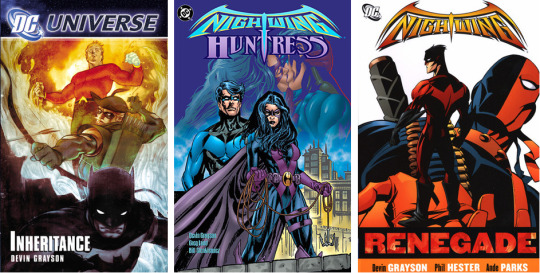
Timelines. What was your way of dealing with confusing comics continuity? And especially within the Bat-verse?
I hope this isn’t disappointing, but to honest I no longer follow DC continuity at all. In the past I’ve compared leaving a comic series to breaking up with a lover; you hope they’re doing well, but you don’t really feel the need to check up on the details of their continued existence without you. ;-p
When I was actively working in Gotham, though, I relied on a combination of extensive background reading, informal updates from friends (about what they were reading) and colleagues (about what they were writing), and sheer force of will. By sheer force of will I mean that to write in the Batman universe -or in any established fictional realm, really -you need to have a clear vision of the world and the characters moving through it. And that means that if you have to, you ignore anything that doesn’t fit into your vision.
My preferred method of working on franchise characters is to do what I like to call a deep dive. Before I start writing, I read everything about them I can get my hands on, including academic analysis and summaries. Inevitably, I’ll find something that grabs me - with Batman it was his relationship with the first Robin, the idea that he was as driven and dark and scary as he was, but was also raising a kid. For the Doctor Strange novel I wrote, I started completely cold (I’d never read a Doctor Strange comic when I first got the assignment) but the first thing that grabbed me was the death of his sister. The few times I’ve worked with Superman I spent a lot of time thinking about how he was raised as a farmer. Whatever it is, I let it carry me further into the character’s world and/or psyche and I try to explore facets of it as I write about them. At that point, I’m pulling on previous continuity, but I’m also creating my own, new continuity.
Comic readers tend to favor really tight continuity, but you have to remember that you get that at a cost. Every creator comes to the table with their own ideas about the characters and their own references and their own stories, and the more you make them toe the line, the less you’re making use of their uniqueness. When I started working for the Bat-office, there were several different Bat-books, each with a slightly different take. Batman was for superhero stories, Detective was more mystery/noir , Legends featured contained stories that could fall anywhere in the history of Gotham, Chronicles was more of an anthology and testing ground for newer talent, and when I started Gotham Knights, my explicit intent was to have it highlight the relationships in the primary Bat-family. To some extent, those books all existed in unique fictional universes, until we deliberately brought them together for crossover events. I mention this because I worry that superhero comics have a tendency to become overly homogenized when everyone has to adhere to a strict continuity. No matter how great any given writer is, do we really want ALL the comics coming out of any given publisher to feature his language, ideas and storylines?
The stories you hear about Batman - all of them - are legends. Some may be spot on, some may be less than true, but the great thing about fiction is that, unlike reality, it isn’t actually necessary or useful for all of us to agree on what happened. Alternate takes are welcome, which is one of the reasons I’ve always championed fanfic.
tl;dr: I learn it. And then I ignore it. ;-p
Can you remember writing some scene or part of a story and being beyond excited of how it is turning out to be? Do you usually anticipate reader’s reactions for something particular that you wrote?
Okay, two separate questions here. First: yes, absolutely. A secret about writers is that behind closed doors, most of us suspect we’re talentless frauds and that at any minute someone is going to notice that we’re literally just making stuff up. But at the same time, most of us have a few moments every week, or a few lines in every project, where we stop, grin, and think, “damn, I’m good.” I am probably not supposed to share that secret, and I apologize to my colleagues for doing so, but the thing is…writing is magic. You can study all the craft of it, learn all the structure and all the tools (as you should) and still, there’s a point where you feel like you’re just listening and writing down a story that is coming to you from somewhere else. And when it’s good, it’s such an amazing feeling. It leaves you a little bit in awe.
Specifically, the two things I remember are 1) having to stop and catch my breath the first time I wrote the word “Batmobile” in a script I was getting paid for and 2) the first time I saw the art come in for USER, and characters that had previously existed only in my head had suddenly been brought to life by John Bolton and Sean Phillips. Those were both very exciting moments.
As for anticipating the reaction of readers; no, I don’t do that. I don’t even really think about the readers when I’m writing beyond, perhaps, the artist (who I want to keep engaged) or editor (who I want to keep happy). I think it would be a little paralyzing - not to mention futile - to try to guess how people will react. You don’t even really know who’s reading it, honestly, which is one of the reasons why it’s really nice to meet readers at conventions. But I’ve always suspected that the best writing comes from writing to and for one specific person - usually a colleague or loved one.
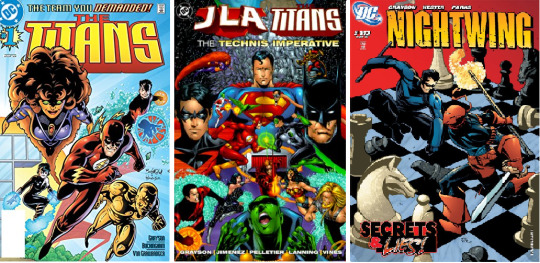
What would you tell to those saying comics are not a real or serious literature and shame it readers for needing to “have pictures to understand the plot”? Unfortunately it is still a case of misunderstanding.
Well, first of all, I try to make a distinction between superhero comics, the publishing subgenre, and comics, the medium. Superhero comics are not, if we’re being honest, always serious literature. But comics as a medium is an amazingly complex and diverse form of story-telling that supports everything from newspaper comic strips to literary fiction graphic novels. It’s particularly remarkable for being the most collaborative form of story creation and story consumption available, relying on multiple creators for its inception and relying on readers to actively simulate time, motion and sometimes even events out of the spaces between panels. The best book I’ve ever read on the topic - and one that could make even a hardcore cynic reevaluate their understanding of what “comics” is - is Understanding Comics by Scott McCloud. There are also so many amazing graphic novels out there, from Spiegelman’s Maus to Chabouté’s Alone.
Unless it’s not comics they have an issue with so much as superheroes, in which case you can talk to them about contemporary mythology and the power of allegorical story-telling.
You’re right, though, that it’s a very misunderstood corner of publishing. I don’t often have people try to tell me it’s not literature, but I can’t count the number of people who have learned what I do for a living and assumed I have a lot of material I can share with their child. The idea that comics are for kids is a throwback to 1950s American marketing. As I’m sure you and your followers know, comics haven’t really been for kids in over five decades. I still haven’t shown my ten-year-old my Batman or Nightwing work and don’t plan to for some time.
The last thing I’ll say on the subject is that sometimes people have to be taught how to read the art in a comic. I think people unfamiliar with comics assume that the pictures in the panels are just literal representations of the words, which is rarely the case. Comic fans are actually quite accomplished readers who know how to invest in long stories, detect subtle tensions between artistic and linguistic storytelling, actively participate in moving narratives forward and, of course, engage with huge, complex fictional universes.
Do you feel like there is not enough representation of bisexual heroes/superheroes in comics and pop-culture? We know Diana Prince is bisexual and she never got a canonical girlfriend.
Yes, I agree. The LGBTQA population, as a whole, is grossly underrepresented, along with non-heteronormative relationships and non-gender binary individuals. Just this morning, actually, I was told I couldn’t go forward with a storyline exploring a canonically confirmed asexual character joining an asexual support group, because the publisher wanted to play “that angle” down. As someone who is openly bisexual, this distresses me, but not half so much as the appalling underrepresentation of people of color and women, especially considering that both groups each make up more than half the population. As the recent phenomenal success of both the Wonder Woman and Black Panther movies demonstrate, the world is more than ready to embrace corrections to these imbalances, but the people (oh, who am I kidding? Read: white men) who run the engines of pop culture - not to mention literary culture, history, and advertising - are incredibly averse to change. It’s so, so important to see yourself reflected in your own culture, but the presence and participation of women and people of color, not to mention bisexuals, is so deeply biased it’s difficult to fully comprehend the multiple levels of exclusion.
It’s hard for me to even talk about this these days because I don’t know where to start. The relentless use of female characters to stimulate growth in male characters? The complete absence of female internal lives in so much of literature? How about just pure invisibility? I remember watching TV one evening and noticing - all at once and with a shock that I’d never seen it before - what I call the gender ratio. The world, according to movies and television shows, consists of one female for every three males. There are exceptions to this, but watch how often it’s true. And of course, it’s even worse for people of color, who tend to appear at about a one to nine white people ratio. Now walk outside. Is that what you see? Of course not, not even close! But we’re so used to the culture we’ve been fed that we hardly notice anything’s amiss when we look at entire fictional landscapes almost wholly devoid of women and POC. What do you think that does to our psyches? To our sense of fitting in in the world? To our sense of, and compassion for, one another?
The dearth of bisexual superheroes strikes me as a wasted opportunity to explore organic and complex ranges in human sexuality - great story-fodder, that! - and I hope it changes. But not all superhero stories have to deal with the sex lives of the characters. Every single one of them, though, has to confront both the gender and race of the characters portrayed, and holy f--- do we have a long way to go there.

We were delighted to see the #VisibleWoman going around Twitter earlier this year. Did it prove itself to be useful? What you do you think about this way of using social media to make a statement and make it work?
This plays directly into what I was just talking about. It’s so weird to think about, but we are so often literally invisible - in fiction especially, but in the real world, too. As a writer, I spend a lot of time summoning and then editing the default story ideas that come from my subconscious, and once I began to be aware of the issues we’ve been discussing, I was dismayed by how deeply all of that background misogyny had lodged itself - it’s an issue I’m still exploring and excavating today. I grew up hearing people say that women were important and should be treated fairly, but I saw so few of them. They were absent or scarce in most movies and TV shows, whittled down to a small subgroup in literary fiction writing, hard to find in the music world, almost never part of political news or history lessons…I can’t even imagine how different my internal world would be if I’d been exposed to a more balanced cultural tally.
So, yes - I do think the hashtag was useful, both as a marketing tool (my single tagged tweet garnered me over three hundred new followers and is now pinned to the top of my account) and as a huge, warm searchlight picking accomplished females out of the crowd. Just being reminded that there are women working in comics and games and STEM and business and politics is enormously helpful. Having a platform available to connect with and support them is that much more powerful.
I do have concerns about social media, some quite grave. But #VisibleWoman stands as an example of best possible usage.
And finally, do you keep in touch with your high school or college teachers who taught you English or Writing? Do you think they know you have became a successful author and would they be proud of you?
Great question! My answer is multi-tiered because those people - mentors - change and evolve over time. So the short answer is no, I’m not still in touch with any of my high school or college teachers and I doubt they’ve kept track of me. I went to three different high schools and so didn’t form strong attachments to many teachers - the one exception was a Social Living teacher at Berkeley High, Nancy Rubin, who I did stay in touch with for many years after I graduated. She didn’t teach me to write - though she did encourage us all to keep daily journals, which can be a gateway drug to compulsive writing - but she was that special teacher who saw all her students as individuals and honestly cared about our opinions and our struggles and our lives. I was actually still in touch with her when she published her first book - Ask Me if I Care, Voices from an American High School - and I was very proud of her! I’m sure she’d enjoy hearing about my crazy career, but she was proud of all of us, even then, just for being.
I didn’t make a strong connection with my college writing teacher, the novelist Mona Simpson, but was crazy about my post-collegiate writing instructor, the novelist Brian Bouldrey, who was still part of my life when I first broke into comics and was enormously tickled by it. Now that you’ve got me thinking about him again, I think I’ll try to track him down again and send him a copy of my Doctor Strange novel. xD
In comics, I have three main mentors and I’m still in touch with all of them and know that they’re proud of and happy for me. Overall, the professional comics community is very supportive and full of hard-working people who care about the medium, the characters, the readers, and each other.
Thank you for these great questions and for you interest in my work!
Thank you, Devin! It was a pleasure and we are grateful for your amazing and detailed answers, and of course for your time :)
A i my velice děkujeme a doufáme, že jste si interview užili stejně jako my!
- Kara
#comics holky#interview#women in comics#comics ladies#devin k grayson#devin grayson#nightwing#batman#batfamily#comics#dc comics#dc#gotham
6 notes
·
View notes
Note
How dare those people complain that in a real world where people constantly try to diminish pocs by comparing anything they do to a white person, the most influencial creator of a industry that get out of their way to fuck stories told and made by minorities, imply that it is a happy ending that a black kid realize that no matter what he does, his motivation is illusory and invalid compared to Peter’s and that any of his successes as Spider-Man are but a pale testament to how great Peter is
a) The comic book industry doesn’t go out of its way to denigrate black people.
b) Literally EVERY derivative version of any given character is automatically going to be compared to to the original version. Kyle Rayner, Wally West, Bucky, jean paul valley, Terry McGuinness, Dick Grayson (sorta, depending upon whether the writer remembers his ethnic heritage), Mayday Parker, Otto Octavius, Ben Reilly, Kaine, Tim Drake, Jason Todd, Stephanie Brown, and some I am not thinking of are all WHITE characters who were by virtue of being legacy characters continuous compared to their predecessors.
c) ANY character who’s been around for decades and decades, has had multiple adaptations and a very stories history is OF COURSE going to be viewed as the legitimate version.
The replacement or legacy character scenario with characters like Miles is akin to you having a BFF that you work at the office with called Dan who you’ve known all your life and been though a lot of stuff with, then some other guy shows up and says he’s the new Dan. And he’s just as great as the old Dan, even though he hasn’t been around for as long and not proven himself to the same degree as Dan has at the same job. And then other people int he office sing New Dan’s praises as being as good (and some people even say better) than the old Dan...even though he’s objectively not. And people even start denigrating the old Dan because the New Dan is just better because reasons.
And then if you don’t AGREE with that, if you don’t think new Dan is just as good and deserves to be Old Dan’s equal in the same role or that Old Dan really was better and the best guy for that position YOU are apparently an inherently bad person.
That’s what this whole situation with Miles, and other (but not all) characters has mutated into.
Like I said in the original post that you apparently didn’t bother to fucking read.
Neither Miles nor Peter should be treated as or interpreted as a white or a black person first and foremost. They are first and foremost characters/people.
LITERALLY if you had the exact same scene but Peter was black and Miles was white the sentiment and the dialogue would be the same.
Idiots like you or the Bleeding Cool author wouldn’t see it the same way though. Because you are NOT looking at them as characters or as people and following the along with the realistic emotions that would be engendered from that scenario (which is you know, the fucking POINT of reading these damn stories) nor are you treating the characters worth and merit upon the basis of their established histories in and out of the fictional universe.
You are first and foremost or else ONLY viewing it through the lens of social politics specifically identity politics (or a particular viewpoint within ID politics).
And you SHOULDN’T be.
You SHOULDN’T be viewing these PRIMARILY or ENTIRELY through that lens.
Because it exists for a creative storytelling purpose and THAT is theerefore the lens you should chiefly evaluate it from.
And you know placing things into context.
This is Bendis. Bendis is aware of the topics at play here and it’s part of WHY he created Miles. Bendis has stated he would actually like Miles to permanently replace Peter and for Peter to be retired as a character.
So is it REALLY that likely that his intentions were to say Miles will never be as good as Peter and Peter is the real deal Spider-Man?
No it isn’t...even though that’s 100% true.
Like I said in the original post, the role of Spider-Man and the concept of the character has NOTHING to do with merely being a spider themed crime fighter. The whole concept is rooted in the SPECIFICS of Peter Parker’s life and character.
It’s not like Green lantern or the Flash or even Batman.
To be Spider-Man is to be Peter Parker.
And Peter has proven himself so far and beyond anything Miles has yet or probably ever could do. Shit from a creative POV you wouldn’t want him to it’d be redundant to have Miles suffer in the same ways Peter has or to have relationships in his life akin to Peter’s wherein he has to support his ailing widowed mother and has no friends. His mother, his father and Ganke are ASSETS to Miles story that help make him unique and modern as a superhero much like Mayday Parker was. Which is why when both characters were put through grief due to losing a parent it was utterly cliche reductive bullshit.
But all that’s a tangent.
As I said, Peter has proven himself in ways Miles has not yet and would be difficult to do so.
The damn issue highlighted this.
Peter’s life is profoundly hard and painful and that pain is part and parcel of what forged him into Spider-Man and what it meant to BE Spider-Man.
Miles then recognized all that and in being aware that he didn’t have it his role as Spider-Man was a tribute to Peter and sharing it with him but not truly owning it the way Peter had.
Because again Spider-Man=Peter. It’s part of his specific life.
Oh an btw
“his motivation is illusory and invalid compared to Peter’s and that any of his successes as Spider-Man are but a pale testament to how great Peter is“
You missed the fucking point apparently.
To begin with the ending was ACTUALLY about Miles seeing Peter’s pain and what he goes through as Spider-Man and realizing he was kind of should be Spider-Man because of it, that Peter was paying him a great honour by giving Miles his blessing to carry the name of Spider-Man given how much it means to Peter on a personal level (in a sense Peter is conferring a part of himself onto Miles, and a painful part at that) and so Miles in slacking off with it realizes he should take it more seriously.
Secondly Miles recognizes his motivation is illusionary and invalid compared to Peter? No. That is literally NOT what happened if you bothered to pay attention to the goddam story.
Thirdly...Miles motivation has LITERALLY been invalidated in-universe. His motivation was to alelviate his guilt over Ultimate Peter Parker’s death and to fill the void he left behind by living up to his legend.
Except Ultimate Peter came BACK to life and now might never have existed, whilst Miles himself exists in a universe where those events never even happened and Peter is alive and operating as Spider-Man.
So Miles’ motivation has been gorssly undermined as has the POINT of his whole character. Ultimate Peter should never have returned and Miles should never have been removed from the context that he was designed for in the Ultimate Universe.
And on a final note there are some saliant points made in this video that go against your whole asinine line of argument.
youtube
Try watching the whole video and you know paying attention to it’s points.
12 notes
·
View notes
Text
I got tagged by @marvelandponder a while ago, but I’m just getting to it now (I’ve been sick, working on some videos etc.)
Rules: List 10 good things that happened in 2016 and then tag 10 friends
Now, marvelandponders list consisted mostly of entertainment related things, and while there were a few good things that happened to me in 2016 (going on more vacations, my parents overcoming sickness, getting closer to you guys) I realized that while 2016 was pretty lousy in places, it was an amazing year for entertainment! Which is why I decided to take a page form her book and talk purely about entertainment. Because that’s what I do best.
Also, 10? 10′s not how I roll. Let’s do 12! But first, keep in mind that there were a few well regarded things in 2016 I haven’t gotten around to watching yet. Like Deadpool, Stranger Things, Moana. In fact, Doctor Strange, one of my most anticipated movies of the year, came out during probably the most stressful time of the year or me. So I couldn’t find the time to go see it. Just a little disclaimer. So, under the cut, there will be My Top 12 (somewhat arbitrarily ranked) Awesome Entertainment Things in 2016! Except for the top 3. Those are less arbitrarily ranked. On with the list!
12- The Ace Attorney Anime
Okay. Full Disclosure. I actually haven’t finished this one yet. I got pretty busy during the Turnabout Goodbye arc and just haven’t gotten back to it. But what I did see was great! Ever since I got into Phoenix Wright in 2014, I have been hoping for an anime. And in 2016, it finally came. I know there are people that have problems with it or just generally don’t like it, and that’s fine. But for me, I had a ton of fun watching what I did of these famous moments from the game come to life, and I thought it was a great adaptation. I do hope it gets an English dub one of these days (maybe by then, I’ll have finished Justice For All)
11- Kung Fu Panda 3
One of my most anticipated movies of the year. And while this was a pretty stellar year for animated movies (for the most part), I tried not to forget the badass-itude that was Kung Fu Panda 3. Anyone who loved the first two installments is not going to be disappointed. Giving the same level of comedy, emotional depth, incredible action and wonderful animation that at first we wouldn’t expect form something called “Kung Fu Panda”, but now we wouldn’t expect anything less.
10 - La La Land
One of the perks of procrastinating on this list is that I got to see La La Land before I finished this. And I’m glad I did, because this movie is as good as everyone says it is. It’s a visually stunning film that manages to embody the spirit of classic musicals right in the middle of 2016. A lot of us thought it wasn’t possible to carry that style into a modern setting, but this movie does it so gracefully that I hope others give it a try. And as someone who is a big fan of those musicals, it was right up my alley. But it also has a wonderful message behind it that rings true to anyone who tries to pursue something in a creative field. I won’t say too much more for fear of spoiling it, but it’s a wonderful film. It’s as good as everyone says it is, and like the ads are saying, if you’ve seen it already, see it again!
9- Kubo and the Two Strings
One of the most underrated movies of the year! This was a movie that was incredibly well done but insanely difficult to market. Seriously, if you’ve seen the movie, you probably know what I mean. You cannot go 10 minutes into this thing without giving something major away. What I can say is if you know those people who think animation is just for kids, and can’t do anything deep and impactful, show then this. It’s a beautiful film in animation, storytelling and performances. I personally have a bit of a problem with the ending, but that’s just me. Everything else about it is marvelous, and I’m glad people hyped it up enough to encourage me to check it out.
8- The People vs O.J. Simpson
Now this may seem like a weird addition to this list, but there is a reason this mini series is winning every award ever. And watching this was, an interesting experience for me, because I saw it with my Mom, and it was like watching this very well done series through two different lenses. I knew about as much as any millenial does about the OJ trial, but my Mom lived through it, and recognized moments throughout the trail and the broadcasts they were re creating. While I was just stunned at the kind of things that happened during this trial, my Mom was able to validate that yes, that is how it happened. This is one of those shows where if they didn’t do this as well as they did, it was going to crash and burn, but they pulled it off gracefully, and that’s why it deserves all the awards.
7- Steven Universe: Bismuth
I decided that unless a show began and ended in 2016, I could only include one episode from it, and as great as Steven Universe was this year, none compared to this one for me. The 100th episode of any show is sure to be a big one, and while Bismuth isn’t exactly a spectacle or a celebration of the show reaching this milestone, it is an amazingly well done episode that may be one of the most well crafted stories in the show (and that’s saying a lot). It brings the same level of quality that any other SU episode does, but it goes above and beyond, bringing twists and new perspectives that are still effecting the show today. I really can’t believe I haven’t reviewed this yet, because I have a lot to say about this one. But for now, let’s move on to…
6- Finding Dory
With all of the amazing animated movies we had this year, Finding Dory seems to have gotten lost in the shuffle. And that’s kind of a shame, because it does something that is an immediate red flag for most, putting the comic relief in the spotlight, and actually delivers a well made movie that can be compared well with the original. While I had been waiting for this movie for a while, I was hoping for it to be pretty good, and what I got was a great time that delivered all the feels. Seriously, there are some heart breaking moments in this movie. But what else do you expect form Pixar at this point?!
5- Captain America: Civil War
Oh my God! This movie was everything I wanted it to be and so much more! The fact that this movie borrowed a premise from one of the most despised comic book arcs in modern history, and managed to fulfill all of the untapped potential while building on all of the previous Marvel movies and was able to introduce new characters and get us to feel just as much for them as we do for the other Avengers we’ve known for years is astounding! Take that Batman v Superman! This may be the most well balanced Marvel movie so far. You understand both sides of the conflict, everyone has well thought out and understandable motivations, the action is some of the best in the franchise, and if it turns out that this is the last Captain America movie in the MCU, I would be 100% okay with that.
4- Zootpoia
I actually wasn’t anticipating this movie that much. But by the time I saw it, it had gained quite the reputation of being a wonderful film with a fascinating world, fleshed out main characters, and gracefully addresses social political issues in a family film. And after finishing it, I couldn’t agree more. I’ll be really surprised if Zootopia doesn’t win the Oscar for Best Animated Feature. This is one of Disney’s best (and again, that’s saying a lot), and it’s such an important movie that still manages to be a fun buddy cop movie. It’s not preachy. It doesn’t talk down to it’s audience. It was a risky move, but it paid off miraculously.
3- Sherlock: The Abominable Bride
Yeeaaahh. No surprise here. Of course the Sherlock Christmas special that takes these characters back to their Victorian roots with tons of callbacks, an engaging mystery, and deep character exploration was going to make it here. I was so, so excited for this, being the big Sherlock Holmes geek I am, but this special actually managed to be so much more then it was advertised to be. I don’t want to spoil it, but I have reviewed this episode, and I gave it a glowing review. It’s one of my new favorite episodes, and given how much competition it had, that’s an achievement.
2- Pokémon Sun & Moon
Well, duh. I could have put Pokémon Go in this spot, since it made Pokémon a worldwide name again (for better or for worse), but I decided to go with Sun and Moon. Not only was anticipation for this game a ton of fun, with the excitement for each new Pokémon and feature that was announced being contagious, but the game itself was so much fun. Yes it takes forever to get to the actual gameplay. Yes there is a lot of hand holding in the first half. But this is probably the most experimental main series Pokémon game I have ever seen. And it really pays off. There are so many new features I love, the story was engaging, the environment, the Pokémon, the journey, it was just so much fun. What a great game to mark Pokémon's 20th anniversary.
#1- Gravity Falls: Take Back the Falls
Of course it’s Take Back the Falls! How could it not be Take Back the Falls? This may have been the most nervous I have ever been for a series finale. This was going to decide for me if Gravity Falls was going to become my new favorite show, and I had no clue how they were going to conclude this amazing show. But this was such a wonderful conclusion that had all of the action, intrigue, and emotional stakes it needed to, while giving us a wonderful goodbye to this place and these characters we had come to know and love for 3 years.
And a lot of my friends here on the internet I made through a connection with Gravity Falls. So to be able to celebrate what a wonderful and satisfying finale this was with those people made it all the more meaningful to declare Gravity Falls my favorite show.
So those are my Top 12 Favorite Entertainment things in 2016. I am so sorry that it took so long and that it’s very long and rambly. If anyone else wants to share their favorite things about 2016, I tag you! So feel free to write them up.
ADDENDUM: Okay, real quick. I finally saw Arrival last night, and oh my God! That movie is amazing. I didn’t want to kick any of these things off the list, so consider this an honorable mention. If you want some high concept science fiction and a different take on the first contact story, see this movie! I don’t want to spoil anything, so that’s all I’ll say. SEE IT!
Okay. I’m done. Bye,
3 notes
·
View notes
Text
The Broken Saga
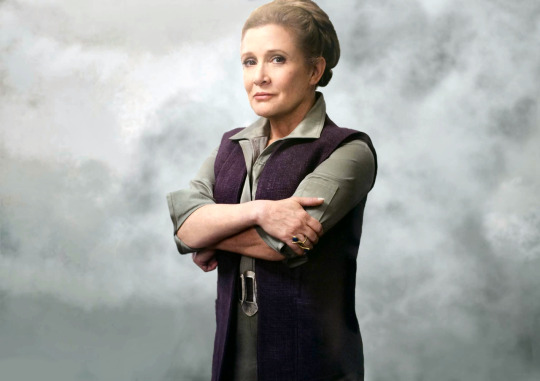
Author note: Like legions of other fans, I’m grieving the death of Carrie Fisher. My heart breaks for her daughter Billie and her and brother Todd, and I recognize that the silencing of Fisher’s unique voice is more important than the loss of the character she played.
This essay was difficult to write. Parts of it are a grief-filled rant. Parts of it explore my own thoughts about how the new saga can be concluded in a way which fulfills the storytellers’ intent while acknowledging the reality of Fisher’s death, and honoring the legacy she created in the iconic character of General Leia Organa.
Parts of this essay are angry. Because make no mistake, I’m angry.
The intentional and unintentional breaking of the saga
Return of the Jedi ended on a high note; Vader redeemed, the Empire defeated, the bright promise of the future in Luke’s Jedi and Leia and Han’s love for each other. In The Force Awakens, the creators chose to break the saga to provide the central conflict of the new trilogy. Lucasfilm and the Story Group took a risk in destroying all the ‘happily ever afters’ of the original trilogy when they began the new stories, and now, in a way they surely never intended, Carrie Fisher’s death has broken the saga in a manner that is irretrievable.
The Hollywood Reporter and other outlets recently published news that Rian Johnson and Colin Trevorrow (director of Episode IX), will be meeting this week (early January, 2017) with Lucasfilm president Kathleen Kennedy to discuss the way forward for the story in the wake of Fisher’s death on December 27. In the coming year and beyond, they will work to create a way to bring the new trilogy to the “deeply and profoundly satisfying” conclusion that Trevorrow promised us back in January of 2016, but Fisher’s death has, in many ways, forstalled this possibility. No matter what the creators choose to do, the new trilogy is now, at its core, a tragedy. Despite the fact that principal photography for VIII was concluded in mid-2016,– the pall of Fisher’s passing will shadow it too and may well affect the story Rian Johnson will give us at the end of this year.
“insiders say Leia was to have been a bigger part of Episode IX than VIII.”
- The Hollywood Reporter, January 5, 2017
It will never be alright again
Star Wars has always been a story about hope. Many of us see the new saga as an unwinding, or reversal of the tragedy of Anakin Skywalker. In this light, the opening words of the new saga, spoken by Lor San Tekka:
“This will begin to make things right,”
are resonant far beyond an implied jibe at George Lucas’ flawed prequels. Star Wars has always dealt in archetypes. In essays I wrote about the story during 2016*, I explored a number of different themes I see underpinning the new saga. From my first viewing of The Force Awakens, I believed that the large arc of the new trilogy will be one of homecoming, return, and redemption. As a fan who has spent the past year immersed in the world of the new saga, analyzing the plot, characters, and overarching themes of the new trilogy, reports that Fisher was anticipated to have a large role in Episode IX came as no surprise. All of central themes of the new saga can be gathered under the framework of one of the most ancient archetypal stories of all; The Prodigal Son.
Carrie Fisher’s death has rendered this tale difficult, if not impossible, to tell while remaining true to the characters created in both the original and sequel trilogies.
Of course Fisher was anticipated to have a large role in the final installment of the tale; what is the return of the prodigal son but a process of coming to terms with the people and relationships one has left behind? The prodigal seeks forgiveness. The prodigal comes home. TFA killed Ben Solo’s father in the universe of the Galaxy Far Far Away. Tragically, Fisher’s death means that General Organa will also be gone before the story ends. From a symbolic standpoint, there is now no “home” to which a repentant prodigal might return.
Unless it was filmed for VIII (and from a narrative standpoint, I have no expectation that it would have been), here are some of the things which will never happen in the galaxy far, far away:
Ben Organa Solo will never see the living face of his mother again.
They will never speak to each other.
Ben will never be able to ask his mother for forgiveness. Nor will she be able to ask for his.
Leia will never see her son in the light again. Never see him whole. Never see him happy. She’ll never dance at a wedding, never hold a Skywalker grandchild.
Lucasfilm and the story group, Pablo Hidalgo, JJ Abrams and Lawrence Kasdan, Kathleen Kennedy - all of them: they destroyed the happy ending of the Original Trilogy, and have left us with this. I weep. I am filled with rage. They have a lot to answer for. Of course no one imagined it would turn out this way, but the storytellers have broken Star Wars in a way that strikes close to its heart, and on some level, no matter what they do, they cannot fix it.
For those of us who have loved the character of Leia our entire lives, this is almost unbearably sad. The storytellers set this particular tale in motion; they took what proved to be an ugly, risky gamble in choosing to tell this particular tale. They have broken the saga, and no matter how they choose to end it, even if they do it well; with sensitivity and courage, they have doomed the new trilogy to some level of tragedy.
Because the terrible reality is that the only honorable, logical, narratively appropriate way to deal with Carrie Fisher’s real death is that in the story, General Leia Organa must also die. This adds a bizarre, free-floating grief to the reality of Fisher’s passing. The destruction of the story – it is another kind of death. For those of us who knew Fisher only through her work as an artist, it is a loss that is bitter, bitter to bear.
“…she burns very bright, and has such a great, generous energy…for that suddenly to not be on set…to have her character; not just her character in the movie, but her character, missing from that very small unit, is a tragedy.”
Adam Driver, speaking of Carrie Fisher, January 6, 2017, with Stephen Colbert
How does the story go now?
At recent conversation around our dinner table, our family talked about how we imagined the storytellers completing the trilogy without Carrie. Most of the ways in which movie makers have dealt with this kind of loss in the past felt deeply inappropriate. It’s possible that our responses are still being strongly shaped by grief – as I write this, we’re only a couple of weeks removed from Fisher’s death in December. Still, I suspect that the views of our average family, consisting of both casual and hard-core fans is pretty representative. Here’s how people felt:
No re-casting.
The Star Wars saga films should not be treated like yet another superhero retread. Carrie Fisher’s Leia Organa cannot be recast to be played by another person. She’s not Batman or Spiderman, a costume to be filled by whatever flavor-of-the-month up and comer is presently in vogue.
No CG.
This is a more difficult question, and a reality it is probably impossible to avoid. With the example of the re-animation of Grand Moff Tarkin (and god, the young Leia cameo) fresh before us in Rogue One, bringing a person back to life onscreen is obviously a newly-emerging reality. Rogue One showed us exactly what that technology can presently achieve, and it is both woefully inadequate to carry the weight of a significant role like Fisher’s, and ethically questionable. Fisher herself was famously outspoken about her unhappiness at being objectified as a fictional character, and railed against the overexposure and exploitation she felt surrounding some aspects of her fame as Princess Leia. She also understood how important the character was to many people:
“Movies were meant to stay on the screen, flat and large and colorful, gathering you up in their sweep of story, carrying you rollicking along to the end, then releasing you back into your unchanged life. But this movie misbehaved. It leaked out of the theater, poured off the screen, affected a lot of people so deeply that they required endless talismans and artifacts to stay connected to it.
Carrie Fisher, The Princess Diarist, page 194
In The Princess Diarist, Fisher describes making peace with the fact that Leia is her, and she is Leia. This passage hints at how she might have felt about the possibility of being turned into a computer-generated entity:
“It turns out she matters to me. Leia. I’ve spent the lion’s share of my life…being as much myself as Princess Leia. Answering questions about her, defending her…wondering who I’d be without her, finding out how proud I am of her, making sure I’m careful to not do anything that might reflect badly on her or that she might disapprove of, feeling honored to be her representative here on earth, her caretaker…[it] made me angry and resent it when other people would try to put words in her mouth without consulting me!“
Carrie Fisher, The Princess Diarist, page 244
Unless Rian Johnson had the foresight to capture footage of Carrie Fisher which could be used for Episode IX, the reality is that some degree of CG work involving Leia is likely to be part of the final installment of the trilogy. As fans, I think we actually have a role to play here by letting Lucasfilm know now, and emphatically, that the fanbase does not want to see Carrie’s Leia turned into a Tarkin-style zombie, that any CG work be kept to an absolute minimum, and that it be avoided altogether if the story can be told without it.
And can it? Could IX reach some form of acceptable ending (if not the “deeply and profoundly satisfying” conclusion described by Trevorrow) even with Carrie and Leia gone?
Yes, but.
As I said earlier in this essay, Carrie Fisher’s death renders the new trilogy tragic in ways that were probably not anticipated, and now cannot be avoided. Even so, it is possible to wrest some form of peace and balance from this story at its end. Despite my angry grief with the story group and everyone involved in bringing us to this painful place in the story, I have some trust that the storytellers have the skill to do it right.
The reality is that the most straightforward way to deal with Carrie Fisher’s real death is that General Leia Organa will die in the story, and that this death will take place off-screen. To me, this feels like the most honorable and honest way to let the truth of Fisher’s passing become part of the Star Wars universe without resorting to awkward and potentially offensive use of CG or re-casting to complete the saga. But oh, just thinking about it hurts. A lot. Many of us who have spent a lot of time grieving in recent days will grieve deeply again. So be it.
As Carrie noted, Star Wars is a story that misbehaves; it won’t stay on the screen. Our understanding of the characters is unbreakably linked to the people who created them and to our own experiences.
When news of Fisher’s heart attack first broke, I had the absurd thought that it was time for Ben Organa Solo to stop his descent into darkness and get himself home; his mother needed him. I can readily imagine a version of the saga in which Leia’s death is the impetus that turns Ben back to the light. I can just as easily envision a version of the tale in which his mother’s death is the blow which finally extinguishes the light in him, but I don’t believe that darker path is likely for the filmmakers to take. The redemption of Ben Solo was the most likely endgame of the new saga before Fisher’s death; now I posit that it is the ONLY acceptable way in which the new trilogy can end.
Is there a way to tell the story without CG or re-casting which permits some final reconciliation between mother and son?
Yes, but.
Star Wars is a universe in which the dead sometimes appear to the living in the form of ghosts, and it is possible to envision a version of the story in which Leia appears as a Force ghost. In fact, I would almost guarantee that episode IX will make use of this trope to give both the other characters in the story and the audience some form of closure. It’s a gift of fiction that we are generally deprived of in real life. We’ll have to trust the storytellers to handle this with sensitivity and skill.
Star Wars is a universe in which people tend not to send letters, but rather use holos to communicate with each other, so some form of CG might be used to permit Leia to send some form of final message to her son. In Rogue One, this storytelling technique was used when Galen Erso gave his message to Bodhi Rook to carry to Saw Gererra. Galen did not know if his message would reach either Saw or his daughter Jyn; but it did indeed serve as his last message of love and reconciliation to his daughter. In a similar vein, a message from Bail Organa to Leia featured prominently in Claudia Gray’s novel, Bloodline.
Leia, a wartime general, might well have had a “farewell” letter of some kind in keeping for Ben, in the way soldiers who know they might never see their families again have done for centuries.
Actually, we don’t have to invent a message written by the General Organa we met in The Force Awakens, because we know that in Bloodline, Leia composed a letter to Ben at the time their relationship to Darth Vader was revealed. The story so far has not revealed whether this message ever reached its intended recipient. It’s possible that Leia’s message to her son, written long before the events in TFA, might finally reach his hands in Episode IX.
Bloodline didn’t tell us what was in that message, but we can easily guess: Leia told her son she loved him. She apologized for not telling him the truth of his family history. She asked for his forgiveness. She told him she believed in the light in him.
She told him she loved him.
In one of my essays written in 2016, I speculated that the “mystery box” Rey opened in the basement of Maz Kanata’s castle, in which she discovered the Skywalker lightsaber, was the same box in which Bail Organa’s message was found in Bloodline; a keepsake box from the lost world of Alderaan that belonged to Leia as a young girl.
If my speculation is correct, the box and its contents may have a meaningful role to play in episode IX. As far as we know, the box was left behind after the battle on Takodana, but there’s no reason to assume it was not recovered by Maz and returned to Leia. If it was Leia’s keepsake box from her childhood on Alderaan, it becomes a powerful talisman which the storytellers could use to connect Ben to his mother after her death. In TFA, we catch a very brief glimpse of the objects which were in the box with the lightsaber. I don’t know what the storytellers will do with this detail, but I hope very much that the box did belong to Leia, that its contents were her own childhood treasures, and that the box eventually finds it way into the hands of her son. Maybe Luke will give it to him. Maybe Rey will.
A box of keepsakes and a final message would be a heartrending end to a story which should, by rights, have concluded with Leia dancing at a wedding and living a peaceful life, surrounded by grandchildren, but sometimes even fairy tales don’t go that way. Like life.
With much love to our fandom and our storytellers.
The Force is with you, Carrie Fisher. You are one with the Force.

* I’ll edit this and add some links to my old metas soon. XOXO
#carrie fisher#lucasfilm#lucasfilm story group#reylo#star wars meta#episode VIII#episode IX#bloodline#I don't even know how to tag this sad thing#I thought I'd pulled myself together enough to get through writing this without crying#but I was wrong
347 notes
·
View notes